#which is that he SAYS he LIKES the more narrative style of-- for example-- critical role or whatever and that he WANTS that
Explore tagged Tumblr posts
Text
the problem is my mom would probably be WAY more fun to play dnd with than my dad, actually, but the reason the fam campaign fell apart was that we could never get ahold of or schedule with my youngest brother, which would continue to be a problem if we tried starting a new one with my mom instead oTL
#I wanna play dnd with my mom so BAD WAUGHH...#my dad has been playing dnd since high school and is the reason I know it exists#but he's bored by roleplay-- specifically in the most frustrating way possible#which is that he SAYS he LIKES the more narrative style of-- for example-- critical role or whatever and that he WANTS that#like-- I don't think he's lying I think he's just incorrect? but the point is it wasn't an obvious and easily worked-around mismatch#anyway my mom has never played dnd but she knows how the fuck to play make believe#the one time justin did a little like... one-shot is overselling it it was like a taste test of dnd with me and my mom#the way her inexperience manifested was her saying 'and I see a mysterious and suspicious figure watching from the shadows'#ohhh man you're not in charge of that actually but you have GOT the fucking spirit you just need to get the hang of the formal framework!!#[after going through races and classes with me] my character is a tiefling who was abandoned by her birth parents and raised by wood elves#and she's a trickster cleric and her name is sohalia#me: YES YES YES Y#BUT I DON'T KNOW THAT HER HUSBAND WOULD PLAY WITH US... ME AND MY MOM AND *MAYBE* MY MIDDLEST BROTHER WOULD BE SUCH A SMALL PARTY....#about me#irl frens#(and family)
5 notes
·
View notes
Text
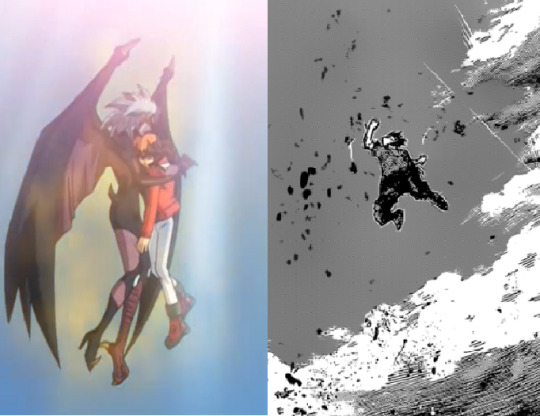
SHIGARAKI VS. YUBEL: HOW TO SAVE YOUR VILLAIN
The failure of Deku to save Shigaraki isn’t just a tragic conclusion for Shigaraki’s arc, it’s also My Hero Academia failing as a story. When I say the story failed, I mean the story has failed to answer any of the questions it asked its audience. It’s themes, character arcs, everything that communicates the meaning of the story to the audience is no longer clear.
Saving Shigaraki was the central goal of not only the story itself, but the main character Deku. By failing in its goal you can’t call this a good ending. In order to illustrate why this goal of saving the villain is so important to both Deku’s character and the central idea of MHA, I’m going to provide a positive example in Yu-Gi-Oh GX were the main character Judai successfully saves their villain. One of these stories fails, and the other succeeds. I will illustrate why under the cut.
BROKEN THEMES = BROKEN STORY
When artists draw they have to consider things like perspective, anatomy, shading, light, coloring. Drawing has rules, and it’s hard to produce good art without knowing these rules beforehand. If I draw something that has bad anatomy, you can criticize me for that.
Writing has rules, just like drawing. The rules of storytelling are important because writing is an act of communication. You can write whatever you want, just like how you can draw whatever you want, but if you break the rules the audience won’t understand what you are trying to communicate.
When I refer to MHA as a broken story, I am referring to the fact that it has broken the rules of storytelling. As this youtuber explains.
“I guess we should first define what broke and broken even means in this context. Has the story turned into an unintelligible mess? Not really. Value judgements aside, the narrative is still functional and fulfills the criteria of being a story. So how can a story that still functions be broken? Maybe to you it cannot. But to me a story that is still functional isn’t enough. What I mean when I say MHA is broken is that it’s lost something crucial. A codifying style of structure, pacing and payoff that until a certain point was the core of its identity.”
I could launch into a long-winded explanation of what themes are, but for the sake of simplicity I like to define themes in terms of “Ask, and answer.” The author asks a question to the audience, and then by the end of the story provides an answer. The audience is also invited to come up with their own answer which prompts them to think about the story on a deeper level. The question both MHA and GX are asking both its main characters and the audience is “Can you save the villain?” with the additional complicated question of “Should you save the villain?” This post will detail how both stories go about answering those two questions, and more importantly why those answers matter for the story.
With Great Power… You know the rest.
My Hero Academia and Yu-Gi-Oh Gx are actually similar stories once you get past their superficial differences. MHA is a story with way better worldbuilding, compared to a society where everything revolves around the trading card game, and people go to school to be better at a trading card game.
However, if you get past that. They are both bildungsroman, stories about the main characters growing up into adults. They both have an academy setting where the goal is for the main character to graduate and enter the adult world. They are both shonen manga. GX is the sequel of Yu-Gi-Oh a manga that ran in Shonen Jump the exact same magazine as MHA. The biggest point of comparison is their main characters, who both start out as young and naive who are driven by their admiration of heroes. Deku is a fan of All Might who wants to become a hero despite not having a quirk, because he loves All might who saves everyone with a smile. Judai’s entire deck archetype revolves around “Elemental Heroes’ and later “Neo-Spacians” who are all based on popular sentai heroes like ultraman.
The central arc for both characters is to grow up. Growing up for both of them not only requires figuring out what kind of adult they want to be, but also what kind of hero they want to be.
Now I’m going to drastically oversimplify what a character arc is.
A character arc first starts out with the character being wrong. Being wrong is essential because if the character is right from the beginning, then there’s no point in telling the story. A character often holds the wrong idea about the world, or has some sort of flaw that hinders their growth. The narrative then needs to challenge them on that flaw. It usually sets up some kind of goal or win condition. That flaw gets in the way of a character “winning” or achieving their goal, so they need to fix that flaw first. If their ideals are wrong, then they need to think about what the right ideals are. If they’re too childish, they need to grow up. If they have unhealthy behaviors or coping mechanisms, they need to unlearn it and require better ones. Otherwise, that flaw will keep sabotaging them until the end.
I’m borrowing the word “win condition” from class1akids here because it’s an incredibly appropriate terminology. Midoriya needs to do “x” in order to win, otherwise this victory doesn’t feel earned. The “x” in this case is usually character development. As I said before, a story where the main character hasn’t changed from beginning to end feels pointless. Especially in Deku’s case, he was already a brave, strong hero who would charge right into battle and defeat the bad guys in chapter one, so him defeating Shigaraki in a fist fight doesn’t represent a change.
The story sets up not only “What does the hero need to do to win?” but also “How does the hero need to change in order to win?” A character either meets these requirements before the end of the story, or they don’t and usually this results in a negative ending.
MHA in its first half quite clearly set up both the final conflict of saving the villains, and also that saving the villains is its “win conditions.” The hero shouldn't be allowed to win without first fixing this flaw.
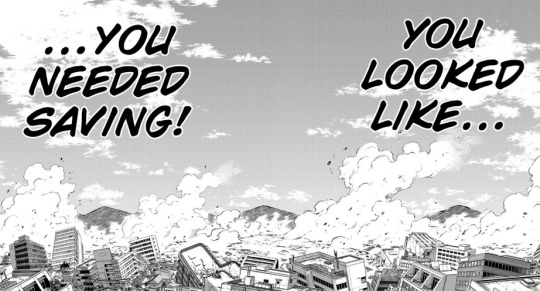
From this panel onward the central question Deku is forced to answer shifts from “Am I strong enough to defeat ShigarakI” to “Can I save Shigaraki?” However, much earlier than that All Might goes on to basically set up the win conditions of what makes the ultimate hero as someone who “Saves by winning, and wins by saving.”
All might: You can become the ultimate heroes. Ones who save by winning, and win by saving.
Therefore the story has set it’s criteria for what kind of hero Deku needs to become. If he wins without saving, then he’s failed to become what the series has set up as the Ultimate Hero.
Shigaraki and Yubel aren’t just narrative obstacles, or boss monsters to be killed like in a video game. They are narrative challenges, which means that the character can’t grow in any way if they don’t answer the challenge presented by the characters. They are villains who actively resist being saved, to provide a challenge for two heroes who define their heroism by saving others. The challenge they pose adds a third question to the story and the main characters.
"Can I save the villain?"
"Should I save the villain?"
"If I don't save the villain, then can I really call myself a hero?"
In other words the decision they make in saving, or not saving their final antagonist defines what kind of hero they are. In Deku’s case it’s even more critical he defines what hero he wants to be because the MHA is also a generational story, and several of the kids are asked to prove how exactly this generation of heroes is going to surpass the last one. The kids growing physically stronger than the last generation isn’t a satisfactory answer, Deku getting strong enough to punch Shigaraki hard is not a satisfactory answer, because we are reading a story and not watching a boxing match.
I’m going to focus on the last two questions though for a moment. Many people who argue against saving villains like Shigaraki argue he is a mass murderer and therefore isn’t worthy of salvation. However, the act of saving Shigaraki isn’t a reflection of Shigaraki himself, but rather the kind of hero Deku wants to be. It all boils down to Spiderman. In the opening issue of Spiderman, teenage Peter Parker is bitten by a radioactive spider and suddenly gains super strength, the ability to stick to walls along with other powers. However, being a teenager he uses these powers selfishly at first. He doesn’t feel the obligation to use his powers for other people, and therefore when he sees a robbery happening right in front of him he lets the robber go. However, because he lets the robber go, the robber then attempts to hijack a car and kills his Uncle Ben in the process. If Spiderman had stopped the robber then he might have prevented that from happening. He had the power to stop the robber, but he didn’t feel responsible or obligated to save other people. As a result Uncle Ben dies. It’s not enough to have power, ti’s how you use that power that reflects who you are, therefore: “with great power comes great responsibility.”
The choice to save Shigaraki actually has little to do with whether or not Shigaraki is redeemable, but rather how Deku chooses to use his power, and what he thinks he is responsible for reflects who Deku is as a person. Deku himself also clearly outlines how he wants to use his power, that One for All is a power for saving, and not killing.
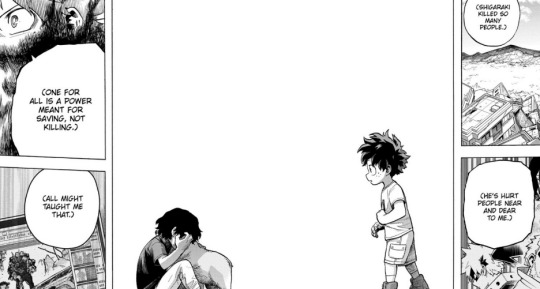
How he uses his power reflects Deku’s ideal in saving others, and therefore if he doesnt use his power to save, then he’s failed to live up to his ideals. It's not whether it's morally right to save a murderer like Shigaraki, but rather the way Deku wants to choose to use his power. It's about whether he feels the responsibility to save others.
Judai explores an incredibly similar arc to Deku. They are basically both asked what kind of responsibilities a hero is supposed to have, which is also a metaphor for growing up to handle the responsibilities of adulthood. As both characters start out with incredibly naive and childish ideas about what a hero is. Therefore realizing what a hero is responsible for is key to them growing as a character. However, Judai is different from Deku. In some ways he’s more like Bakugo. Judai is a prodigy who’s naturally good at dueling. He doesn’t duel to save others, but rather because duels are fun and he’s good at it. He’s very much like Bakugo, who admired All Might as a hero just as much as Deku did, but admired the fact that he was strong and always won rather than he saved others.
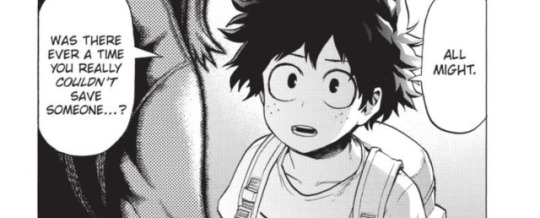
However, I would say both Deku and Judai are questioning what a hero is responsible for. They are both asking if they have the responsibility to use their power to save others. If they have to fight for other people, just because they have power. His first big challenge as a character comes from Edo Phoenix, who calls out Judai for not thinking through what it means to be a hero, and what responsibilities heroes carry. Judai duels because he thinks it’s fun. He will show up to duel to help his friends, but that’s because he’s the most powerful person in the group. Even then it’s because he finds fighting strong opponents to be enjoyable. Bakugo will beat up a villain, but for him it’s more about winning then if the action will save someone or not.
Judai is more often than not pushed into the role of being a hero, he doesn’t play the hero because he’s a particularly selfless person, and he’ll often avoid responsibility if not forced. He has power but no sense of responsibility and the narrative calls them out as a problem.
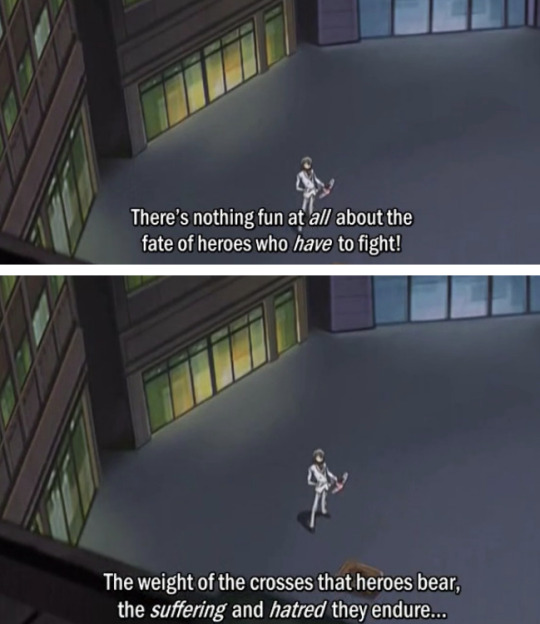
Edo: Can you even fathom that, Judai?
For Judai, he can’t understand the responsibility of being a hero. For Deku, he idealizes heroes so much he can’t understand that there are people out there the heroes have failed to save. These two callouts towards Deku and Judai are discussing similar because they’re both discussing where a hero’s responsibilities lie. Is a hero responsible for saving everyone? Is someone strong like Judai responsible for using their strength to help other people?
Judai’s arc continues into the third season where he’s not shown to just be naive but ignorant. He’s not just childish, he actively resists growing up because he doesn’t want to take on adult responsibilities.
THe same way that Deku just decides not to think about whether or not All Might failed to save people in the panels above. However, in Judai's case he's actively called out for his choice to remain ignorant.
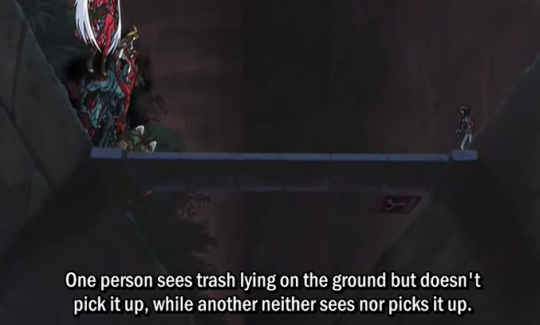
Satou: Now, which one is at fault? Judai: Isn’t it the guy who saw it, but didn’t pick it up. Satou: Not quite. If one is aware of the trash that fell, it may be picked up someday. But there is no possibility fo the unaware one ever picking it up. Judai-kun you are the foolish one unaware of the trash that has fallen. Judai: Are you calling me out for how I am? Satou: Your behavior towards me was atrocious. The worst was attending class only for credit, even if you were there you only slept. Judai: Yeah, I know. I was all bad, but it wasn’t that big a- Satou: It is important. You see, one by one, the students inspired by your attitude were losing their motivation. Now if you were a mediocre duelist, then this would not be an issue. Satou: However, you are the same hero who defeated the three mythic demons. Every single student in the academy admires you. You should have been a model for this academy. Judai: Me, a role model? Are you kidding? I just do whatever I feel like doing. Satou: Great power comes with great responsibility. Yet, as you remain unaware of that, you’ve spread your lethargy and self-indulgence.
seems like a minor issue, but look how Judai responds to the accusations. “I just do whatever I feel like doing.” Satou is arguing that Judai should pay attention to the influence he has on others because of his power, because how he chooses to use that power affects others. However, Judai chooses to actively not look at the consequences of his actions because he doesn’t want to take on that level of responsibility, and therefore he’s looking away from the trash.
While it seems like it doesn’t matter in Satou’s specific example, not thinking of the consequences, or how you use your power can have unexpected consequences. Spiderman doesn’t feel like it’s his responsibility to stop a bank robber, and that bank robber shoots his uncle. You could still argue it’s not Spiderman’s responsibility to stop every crime in the world, and I guess no one owes anyone anything from that point of view - but Spiderman failing to act responsibility had the consequence of directly hurting someone else.
Spiderman has to live with that consequence because it was his own Uncle that was hurt. This is where we really reach the duality of Judai.
In GX, Judai is, symbolically speaking, The Fool of the Tarot Deck, the Novice Alchemist — a person brimming with infinite potential, yet one who is also supremely ignorant, who walks forward with his eyes closed and often unknowingly causes harm in his great ignorance. In this, he is very much the embodiment of the faults we most commonly associate with teenagers — selfishness, recklessness, shallowness, a lack of dedication or empathy when it’s most needed. Like most people, he has good traits that work to balance out some of the above, but his narrative path through GX ends up being that of the flawed hero undone by his faults — and then that of the atoner, the repentant sinner. In his case, the mistakes of his teenage years are the catalyst for his growth from a boy into a man burdened with duty and purpose. Judai is someone with infinite potential, with great power, but also ignorant on how he should use that power, and that makes him an incredibly flawed hero who needs to learn how that power should be used.
Deku similarly exists in a society where heroes deliberately turn a blind eye to the suffering of a certain type of victim. Shigaraki’s speech heavily resmebles Satou’s speech about garbage on the side of the road.
Shigarali: "For generations you pretended not to see those you coudln't protect and swept their pain under the rug. It's tainted everything you've built."
Deku shares Judai’s ignorance, because he’s not only a part of a system that doesn’t even see trash on the side of the road, but he also worships heroes so much that he’s incapable of criticizing them. If Deku saw the flaws of heroes, but at first didn’t have the courage to speak out, but eventually gained the courage that would be one thing. However, if he doesn’t see the flaws of heroes, then the problem will never be fixed.
There are also consequences for both Judai and Deku failing to use their powers responsibly. These consequences take the form of the villains who came about because of all of society’s ignorance to the suffering of victims (Shigaraki) and because of the main character’s ignorance to their suffering (Yubel). Shigaraki and Yubel are also explicitly victims that the heroes failed to save, turned into villains who are active threats to the heroes.
Should I save the villain?
The answer is yes, because the decision to save is reflective of the kind of hero each character wants to be. Each story clearly sets up that Deku and Judai aren’t punisher style heroes who shoot their villains, they are being set up as heroes who save. Deku needs to “save by winning.” As for Judai, a big deal is made of Judai’s admiration for another character Johan who represents a more idealistic kind of hero. Johan unlike Judai is someone who duels with a purpose, something Judai outright says he admires because he’s empty in comparison.
Judai: Johan what have you been dueling for? See, it’s about fun for me… Well, for the surprise and happiness too. I guess I do do it for the fun. Sorry, I guess I put you on the spot by asking out of nowhere. Johan: What’s this about Judai? Judai: It’s nothing. Johan: I suppose there is one goal I have. Johan: Even if someone doesn’t have the power to see spirits, they can still form a bond with a spirit. That’s why I do it for people like him. [...] Johan: I'll fight for everyone who believes in me, and I'll do it with my Duel Monsters. Judai: I'm jealous you've got feelings like those in you.
Becoming a hero who uses their power to help others isn’t just a goal the story sets for Judai, it’s a goal that Judai sets for himself because of his admiration for Johan. Johan represents the idealistic hero Judai wants to be, but is also held back from because of his personality flaws. Johan represents the kind of heroic ideal that Deku is aspiring to be.
Johan’s ultimate goal isn’t punishing the wicked, but to use his power to save others.
Johan: Judai, it was my dream to save everyone through my dueling!
The story sets up the idea that it’s not enough for Judai to simply be strong, he’s also challenged to become a savior who uses his power to help others like Johan. Deku needs to “save by winning” and Judai needs to “Save everyone through his dueling.” However, Johan also adds another condition to what saving means. His idea of saving isn’t to defeat a villain, but rather his dream is to help connect spirits and humans together, even if there are humans who can’t see spirits. Johan doesn’t save people with the power of physical force, but rather the power of human connection.
Should I save the villain?
Here the answer is "Yes", because wants to become more like Johan someone who uses their power to help others not just for themselves. Then we reach the third question
If I don't save the villain, can I really call myself a hero?
It once again comes to power and responsibility. Heroes have great power, and they are responsible in how they use that power, if they use it irresponsibly then there are consequences. Shigaraki wants to destroy hero society, because the heroes irresponsibly use their power to turn a blind eye to everyone’s suffering.
People suffer when heroes fail to live up to their responsibilities. The entire conflict of season 3 is created by Judai failing to save Yubel. If Judai had helped Yubel when they most needed it, instead of abandoning them, then Yubel would never have been twisted by the light of destruction, would never have attempted to teleport the school to another dimension, would never have attacked all of JUdai’s friends.
These consequences matter. Deku can turn his eyes away from Shigaraki’s suffering, but let’s say a hero failed to stop a robbery, or rather he didn’t even try, and because of that his mom was shot and died in the street. Would Deku consider the man who failed to stop a bank robbery a hero? When Spiderman let a bank robber go instead of trying to stop him, was he being a hero in that moment? Both the stories and the characters themselves have defined heroes as people who use their powers to save others, therefore if Judai and Yubel fail to save their villains then they can’t be called heroes by the story’s own definition. Now let’s finally return to the question of "Can I save the villain?"
Was there ever someone you couldn’t save?
m going to start with Yu-Gi-Oh Gx as a positive example of how to save your villain. Gx works for two reasons. One, it’s established from the start that Yubel isn’t beyond salvation, and two, it makes it so Judai can’t win without saving Yubel. The conflict of the story does not end until Judai makes the decision to save Yubel. In some ways the writing is even stronger because Judai is directly responsible for the pain and suffering that Yubel went through that turned them into a villain in the first place. Yubel isn’t just a victim, they’re specifically Judai’s victim.
Yubel is a duel spirit who is also essentially Judai’s childhood friend. A duel spirit just like the kind that Johan wants to save. During their childhood Yubel got too overprotective of Judai, and started to curse his friends for making him cry or upsetting him in any way. Until everyone Judai’s age started avoiding him and Judai became all alone with only Yubel for company. Judai’s decision was to abandon Yubel at that time. He took the yubel card and shot them into space, hoping that being bathed in space rays will somehow “fix” what was wrong with them. I know that’s silly but just go with it. Judai abandoning Yubel had the unintended consequence of Yubel being subjected to the light of destruction, a corrupting light that subjected Yubel to years of pain. This pain literally takes the form of Yubel burning alive.
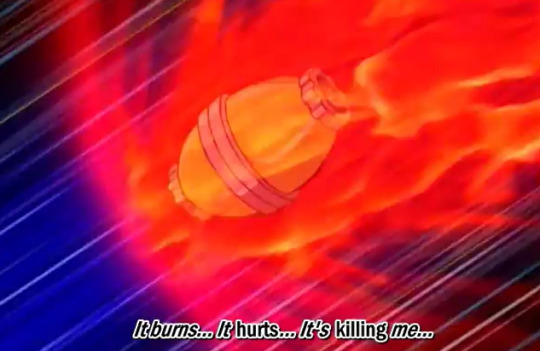
Yubel connected to his dreams called out for Judai every night, only for Judai’s parents to give him surgery that repressed his memories of Yubel causing him to forget them entirely. Yubel then spent the next ten years alone in space, continuously subjected to painful torture, with their cries for help being ignored.
"I was suffering even as you came to forget about me..."
Yubel is then met with the question of how can Judai treat them this way if they loved him so much? As from Yubel’s perspective, they’ve only ever tried to protect Judai, only for Judai to not only throw them away, but subject them to painful torture and ignore their cries for help. Judai effectively moves on with his life, goes to duel academy, makes friends while Yubel is left to suffer in silence all but forgotten. This is where Judai’s ignorance has serious plot consequences.
It’s not just the pain that Yubel endured that made them snap. It’s that their pain went ignored.
Yubel holds out the faint hope that Judai will answer their calls fro help until they finally burn up upon re-entry into earth’s orbit. At which point they’re left as nothing more than a single hand crawling on the ground. Yubel who cannot fathom why Judai would cause them so much pain, and then forget about them, convinces themselves that Judai must be causing them pain, BECAUSE he loves them.
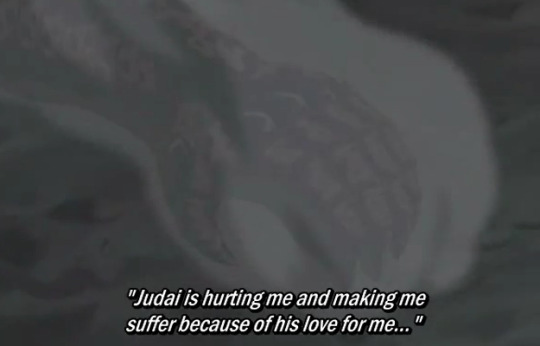
But you see, I couldn't possibly forget about you in the time that I've suffered...
Judai is allowed to move on with his life, to make friends, to spend the next ten years doing so while Yubel is subjected to ten years of agony. When they finally escape their painful torment, they see all the friends Judai has made while they’re left alone and forgotten. However, Yubel’s goal isn’t revenge. Rather, it’s to make Judai share and recognize their pain. WHich is why I said it’s not the fact that they were made to suffer, but their suffering is ignored. Yubel’s entire philosophy revolves around the idea that sharing pain is an expression of love, and that they and Judai share their love for each other by hurting each other.
"That's why I sought to fill all those linked to you, your world, with both sadness and anguish..."
For Yubel, making all of Judai’s friends suffer and Judai themselves suffer is a way of making them and Judai equals again. They want to show “their love” for Judai, but it’s more about forcing Judai to recognize the pain he’s caused them by forcing him through the same pain. Yubel’s philosophy of sharing pain is actually a twisted form of empathy.
They’re not entirely wrong either, that even people who love each other can cause each other pain, and that if one person is suffering alone in a relationship or the suffering is one-sided then there’s something wrong with that relationship.
Yubel: I get it now… You weren’t in love, with Echo. Yubel: No.. you may have loved her just enough to clear the conditions in palace for you to control Exodia, but the you didn’t truly love each other. Yubel: You were only unfairly hurting her, while you stayed unharmed. You wouldn’t suffer. You wouldn’t suffer. You wouldn’t be in pain. Amon: What are you getting at? Yubel: I’ve been hurt! I’ve suffered! I’ve been in pain. That’s why I’m making JUdai feel the same things I did!
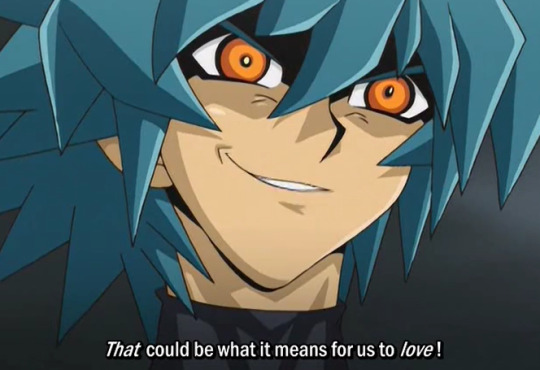
Yubel’s twisted theory of love, is a pretty thinly veiled cry for empathy.
They break out into tears when talking to Amon about the way they’ve hurt and suffered. They clearly state upfront that their goal is for Judai to recognize their love. One of the first things they say to Judai is a plea for Judai to remember them.
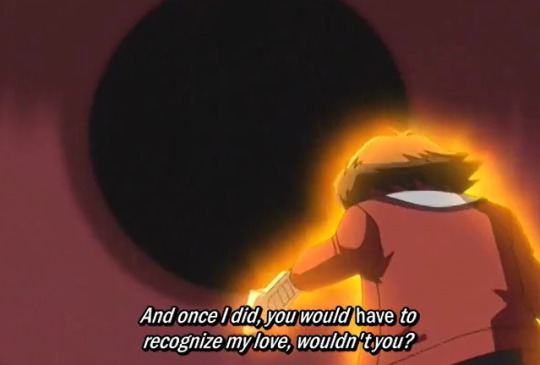
Yubel is presented as a very human character suffering through a lot of pain throughout their entire villai arc, they break down into tears multiple times, they cry out in agony, they're visibly suffering and you see their mental walls begin to break down when Judai denies them any empathy.
Yubel is actually incredibly clear and straightforward about their desire to be saved by Judai. However, Judai doesn’t lift a single finger to help Yubel the entire arc, even though they themselves admit they are directly responsible for Yubel’s suffering but they helped create who they are today.
Judai plunges into a different dimension and gives up everything to save someone, but it’s Johan, not Yubel they try to save. You have Johan, the perfect friend, and perfect victim that Judai gets obsessed over and will not stop at anything to save, and then you have Yubel, the imperfect victim that is actively harming Judai and all of his friends that Judai chooses to ignore. The whole season Judai only focuses on saving the perfect victim Johan, and this is clearly shown to be a flaw. Judai doesn’t just ignore Yubel to save Johan, he also ignores every single one of his friends.
Judai only caring about saving Johan, and deliberately ignoring and abandoning the friends who came with him to help, essentially abandoning them the way he did Yubel leads to another consequence. After he abandons them they get captured, rounded up, and actually die and become human sacrifices.
Losing his friends, causes Judai to snap. Judai becomes the supreme king and decides power is all that matters; he starts killing duel spirits en masse in order to forge the super polymerization card. Which means being left alone, suffering alone, being abandoned by everyone causes Judai to snap the exact same way that Yubel did.
In fact Judai is only saved from his darkest moment, because two of his friends sacrifice their lives, trying to get through to him and appeal to his humanity. At that point Judai’s friends could have just chosen to put him down like a mad dog, to punish him for the amount of people he’s killed, but instead they try to save him because of their friendship.
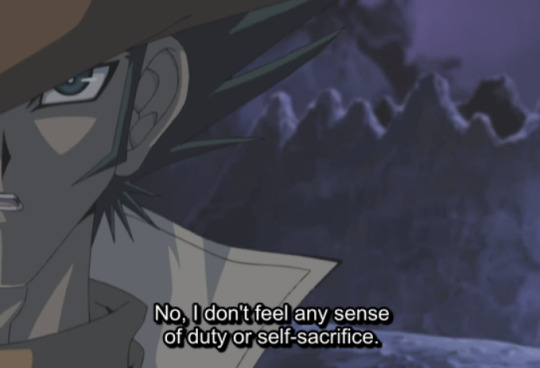
I just want to save my friend. That is all.
By the time Judai is facing Yubel in their final fight, Judai doesn’t have the moral highground against Yubel in any way whatsoever. They’ve both lashed out because of the pain they endured and killed countless people in the process of lashing out. The only real difference between them is that Judai is lucky. He had friends to support him at his lowest point, while Yubel didn’t. Does Judai learn from Jim’s example, and go out of their way to save Yubel the same way they were saved because Yubel is still a friend? Nope, Judai tries to kill Yubel at this point.
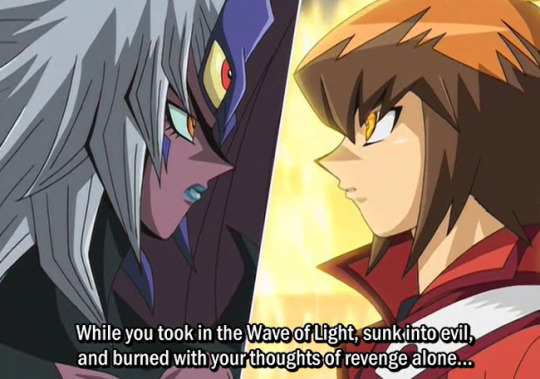
I made a lot of friends... And they all taught me something… real love is wide enough, large enough and deep enough to fill the universe. Your so-called love is only a conceited delusion.
Like, Judai, sweetie baby honey darling. How was Yubel supposed to make friends when they were floating in the empty void of space?
Judai hasn’t learned, they are still ignorant, and still turn a blind eye to Yubel’s suffering. After all if his love is wide enough, large enough,and deep enough to fill the universe then why don’t thy have any room in their heart whatsoever for empathizing with Yubel?
Judai making friends while Yubel was trapped in space doesn’t make Judai a better person than Yubel, it makes Judai lucky. Judai doesn’t even appreciate that luck, because he treats his friends like garbage. It’s not about whether Yubel is worthy of salvation, because Judai is a mass murderer and his friends still went to great lengths to save them anyway. It’s that Judai doesn’t want to empathize with Yubel, because they still want to remain ignorant and irresponsible. Judai wants to continue playing hero, with a very black and white definition of what a hero is. By this point Judai’s killed lots of people, but if he makes Yubel the villain in the situation, he can keep playing hero. He doesn’t have to look at himself and what he’s done, because blaming everything that happened on Yubel and then putting Yubel down like a mad dog allows Judai to absolve his own guilt. Judai practically ignores Yubel’s cries for help, even when Yubel spells it out for them.

I couldn't have lived with the heartache unless I felt that I was being loved...
At this point Yubel themselves acknowledges that their love was just a delusion. That it was a coping mechanism, because they couldn’t live with all the pain otherwise. WIthout it they would have just died, which makes Judai unmoved. The implication here is that Judai thinks yes, Yubel should have just died in that crater. It would have been easier for Yubel to die a perfect victim, then for Yubel to crawl out of that crater and go on to hurt other people. While that may be true the same can be said for Judai - it would have been better if Judai died rather than become the Supreme King. His friends could have put him down like a mad dog, you could have even called that justice - but they didn’t. Judai making no attempt to save Yubel isn’t because he thinks it’s morally wrong to save someone who’s killed as many people as Yubel has, or because he thinks he can’t forgive Yubel, it’s because Judai is taking the easy way out. Johan is a nice, easy victim to save, because he’s Judai’s perfect boyfriend, while Yubel is a complex victim that requires Judai to understand their suffering. Even the act of saving Johan isn’t about Johan himself, it’s about the fact that Judai feels guilt over Johan’s disappearance. What Judai wants isn’t really to save a friend, but to stop feeling guilty over that friend. Judai isn’t just disgusted by Yubel’s actions towards his friend, he also wants to avoid the guilt he feels over causing all of Yubel’s suffering, because it requires acknowledging the complex reality that he is both victim and perpretrator in this case, just as Yubel is both victim and perpetrator.
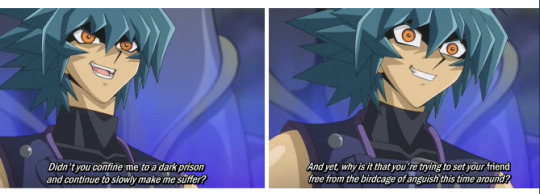
So how can an arc where Judai doesn’t try to save Yubel until the last possible minute, be better than an arc where Deku makes it his goal for the final act of the manga to save the crying boy in Shigaraki?
It’s because the story does not let Judai get away with his continual refusal to empathize with Yubel. Yubel’s entire character revolves around empathy, in the form of sharing pain. As a duel monster, Yubel’s effect is that they are a 0/0 attack monster who is immune to all damage, but when you attack them they deal all the damage back to you. Which means that Yubel will respond to all the pain they feel, by causing you just as much pain in return. Yubel is not a character who can be defeated in a fight, or a duel. In fact they’re the only Yu-Gi-Oh villain who never loses a duel once. The most Judai can do is duel them to a draw, and they draw three times. Yubel wins against everyone else who challenges them. In a way Yubel is like Shigaraki, the ultimate, unkillable enemy that can’t be done away with violence. Judai’s refusal to empathize with Yubel or attempt communication also makes them worse, every time Yubel is hurt they escalate. THe more Judai hurts them, the more they will hurt in return, it’s a cycle that will never be broken simply by killing Yubel, because Yubel is unkillable.
Not only that but the story has gone to great lengths to show that saving Yubel is the correct course of action. If Judai doesn’t save Yubel, he’s basically spitting on the selflessness Jim showed in saving him. In fact if he doesn’t save Yubel, Judai is contradicting his own words on what makes a good friend. Sho once asks Judai after witnessing his brother change, what he should do if a person you lov ehas changed into an entirely different person. What if they're a person you don't even recognize any more? A person you don’t even necessarily like anymore?
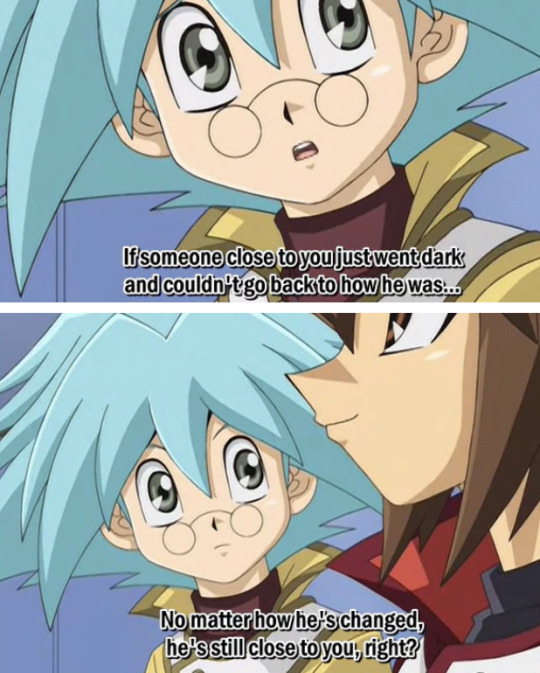
That's why if it were me. I'd probably just be looking after him until the very end, even if I didn't like him. I'd do it cause I think it'd prove that I care about him.
Judai doesn't even say that Sho is obligated to save his brother or morally redeem him, just that he has to keep looking at him instead of turning away or ignoring him.
Judai is being a bad friend, by his own definition. By choosing to deliberately look away from Yubel, Judai’s not living up to his advice for Sho for how you treat people you care about.
Which is why the resolution for Judai and Yubel’s arc is so important, because it’s done by Judai finally acknowledging Yubel’s pain, and promising to watch over them from now on, words that are followed by the action of physically fusing their souls together so they’ll never be alone again. Judai doesn’t just say pretty words about how they won’t ignore the crying child inside of Yubel, but instead he makes a sacrifice to save Yubel at risk to themselves to show their words are backed up by actions. Judai says Yubel will never be alone again, and then he commits.
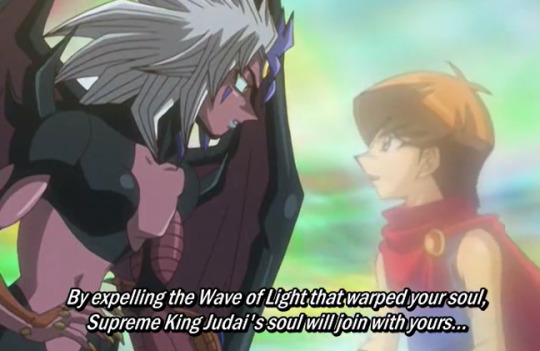
"And even if that means I won't exist anymore... I don't care."
Judai has resolved his character arc by this action, because Judai is finally taking on responsibility and that responsibility is watching over Yubel, so the two of them can atone together. Judai even says himself this isn’t an act of sacrifice on his part, but rather him finally accepting adult responsibilities.
Judai: I wouldn't sacrifice myself for you guys. I'm just going on a journey to grow from a kid into a man.
Judai needed to save Yubel to complete his character arc and grow as a person. If Judai hadn’t saved Yubel, he would have still remained an ignorant child. By learning not to turn a blind eye to Yubel’s pain, and also smacking sacrifices and physically doing something to atone for the way they ignored Yubel up until this point they’ve not only saved Yubel they’ve also done something to address their wrongs. This also continues into the fourth season where Judai’s personal growth results in him learning what kind of hero he wants to be as in Season 4 in order to atone for the spirits that Judai slaughtered, he decides to leave his friends behind and walk the earth with Yubel helping spirits and humans get along with each other. In fact Judai’s final speech as a character isn’t even about how strong he is as a hero, but how weak he is as a person.
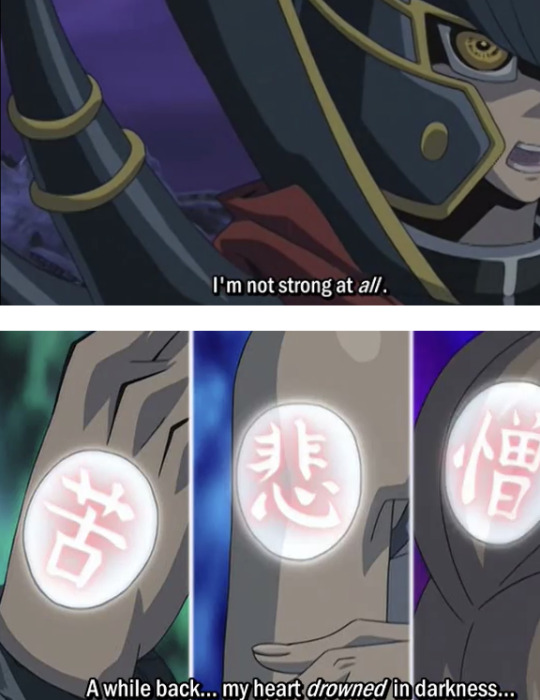
And I put my friends through some rough times. Form that, I figured a few things out... all I can do is believe in them.
The lesson Judai learned is because he’s weak, he needs to empathize and believe in other people the same way that his friends once believed in him when he was at his lowest point. Judai’s not the strongest hero, he’s the weakest one, but that gives him the ability to empathize with people who were lost just like he was, and guide them back from the darkness.
The story of how Deku became the worst hero.
I’m going to say this right now it might turn out next week that Shigaraki is just fine, and he’ll use the overhaul quirk to reconstruct his body. However, even if that happens Deku has completely failed at his goal of saving Shigaraki for the reasons I’ll illustrate below. In theory, Deku’s arc of saving Shigaraki, and therefore winning by saving should be much easier for the story to accomplish and also much less frustrating to watch. After all, Shigaraki has been around since the beginning of the manga, he’s literally the first villain that Deku faces. He’s also the first villain that Deku talks to, where he brings up the idea that there were some people All Might failed to save. There’s also many intentional parallels between the two characters, the entire manga is about their parallel journeys of becoming the next generation hero and the next generation villain. Shigaraki even directly quotes the line at one point that all he wanted was for someone in his house to tell him he could still be a hero, the same line Deku said in the first chapter was that he wanted his mom to tell him to be a hero instead of apoalogizing to him for being quirkless.
Not only is the setup for Shigaraki and Deku made obvious (Deku can redeem Shigaraki by telling him that he can still be a hero too), but Deku himself states out loud that he wants to save the crying child inside of Shigaraki.
Judai runs away from Yubel the whole time, whereas Deku is running towards Shigaraki and actively makes it his goal to understand Shigaraki and continue to see him as a human being rather than a villain. The story also makes it clear that saving Shigaraki is necessary to saving hero society as a whole. After all Yubel is just Judai’s victim. Whereas Shigaraki is the victim of all of society. He’s the crying child who was ignored. The cycle won’t be broken if heroes continue choosing to ignore people like Shigaraki, because more victims will grow up to replace him.
Shigaraki: Everything I've witnessed, this whole system you've built has always rejected me. Now I'm ready to reject it. That's why I destroy. That's why I took this power formyself? Simple enough, yeah? I don't care if you don't understand. That's what makes us heroes and villains.
Shigaraki rejects the world because the world continues to reject him. THe solution to this problem is not rejecting Shigaraki, because Shigaraki won’t go away, the system will just continue to reject people like Shigaraki. As long as heroes and villains don’t understand each other, they’ll keep being forced to fight and the conflict won’t end, because hero society is what engineers it’s own villains.
clear as day by the story itself. If the objective of saving Shigaraki is clear, then how exactly did the story fail in this objective? What went wrong? In this case it’s a failure of framing, and breaking the rules of “show don’t tell.” Stories are all about actions and consequences. When a character makes a certain action in a story, the way other characters around them, the world, and whatever consequences that action frames that action in a certain light. It provides context for how we are supposed to interpret that character in that moment.
For example, when a character does something wrong and another character directly confronts them over what they did wrong, that frames them as in the wrong. The story is criticizing the character for what they did wrong. Context is everything in a story. Stories are just ideas, so they require framing and context to communicate those ideas for the audience. Certain character attributes can be strengths or flaws depending on the context. My go to example is that if you put Othello in Hamlet, the conflict would be resolved in five seconds because Othello’s straightforward personality and determination would have him kill Hamlet’s uncle without questioning things. Whereas, Hamlet constantly questioning and second guessing himself would lead to the worst ending possible. However, if you put Hamlet in Othello, then Hamlet wouldn’t fall prey to Iago’s manipulations, because Othello doubts and questions everything so he wouldn’t believe Iago the way Othello did.
Hamlet’s contemplative and introverted nature can be a strength in one situation, and a flaw in another. Othello’s tendency to act without thinking things through can be a strength in one situation, and a flaw in another. Context matters, because context tells you how you’re supposed to interpret a certain characters actions, and therefore tells you more about that character. This is why people repeat “Show don’t tell” as the golden rule of storytelling, it’s one thing to say something about a character, it’s another to us the characters actions in the story itself to show them something about the character.
What’s even worse then breaking the rules of show don’t tell however, is telling the audience one thing, and then going onto show in the narrative something completely different. In that case the narrative becomes muddled and confusing to read. If I the narrator say “Hamlet is someone who overthinks everything” and then in the story Hamlet walks up to his uncle and kills him with no hesitation, then the narrator is straight up unreliable. It becomes impossible to tell as an author what message I’m trying to get across about these characters, because I’m telling you one thing and showing another.
This is why the writing fails in the second half of My Hero Academia because we are constantly told one thing, but then the story shows something entirely different and sometimes even contradictory to the thing we are being told.
Judai is a much worse hero than Deku, he always runs away from Yubel, and we’re never directly told that he’s supposed to save Yubel either. However, the narrative is incredibly consistent. Judai’s behavior of running away is consistent with his character. All the other character call Judai selfish for abandoning his friends (and they’re not even talking about Yubel). Judai is never painted in any positive light for his actions, therefore we as the audience understand Judai’s behavior is wrong and he needs to fix it. The narrative makes it clear that Judai needs to grow up, and Judai is never rewarded for his refusal to grow up, he’s ruthlessly chewed out, not by his enemies but also by his own friends. However, the narrative isn’t merciless on him either. Season 3 of GX is dark, but it’s not grimdark. Even when Judai loses his way, he’s still shown love and compassion by those same friends who go to great lengths for his sake. The narrative criticize Judai but it never insists that he’s beyond redemption and needs to be put down like a mad dog.
The message is very clear, that not only does Judai need to grow up, but he also deserves the chance to grow and change, which is why he should give Yubel a similar chance. In comparison the story sets out this clear narrative arc for Deku of understanding Shigaraki, but it never challenges him for failing to understand Shigaraki. If you listen to what the narrative says, how other characters describe Deku, and what Deku himself says and only read it on a surface level then yes, Deku’s goal is to save Shigaraki. If you analyze actions however, he is in effect just like Judai he never takes any meaningful action or steps towards Shigaraki, nor does he think of what saving Shigaraki might look like or entail.
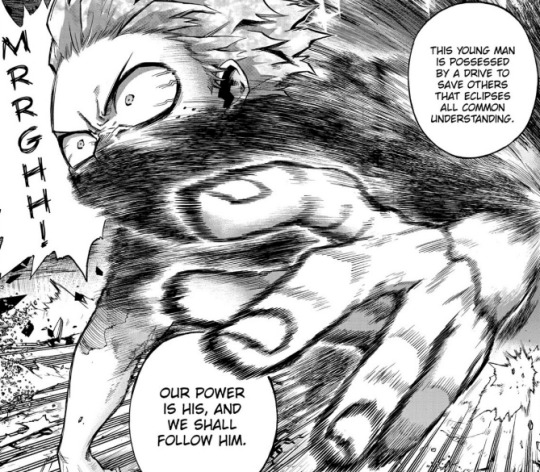
The story describes Deku as someone who is possessed by a drive to save others that eclipses all common understanding, but does the story give us any examples of that behavior?
Judai is characterized as a selfish, irresponsible child, and the story gives us countless examples of his immaturity and how it hurts others. Does the story of MHA do the same for Deku's purported virtues? Let’s run through Deku’s actions, step by step, the actions themselves and how they are framed in order to find any evidence that Deku possesses this drive to save others. Does Deku reflect at all on the question of:
Can Shigaraki be Saved?
Deku leaves on a journey to try to understand villains. When he makes a perfunctory attempt to understand and empathize with Muscle, and Muscle replies that some people are just evil does Deku keep trying to reach his heart? Nope, he just punches him.
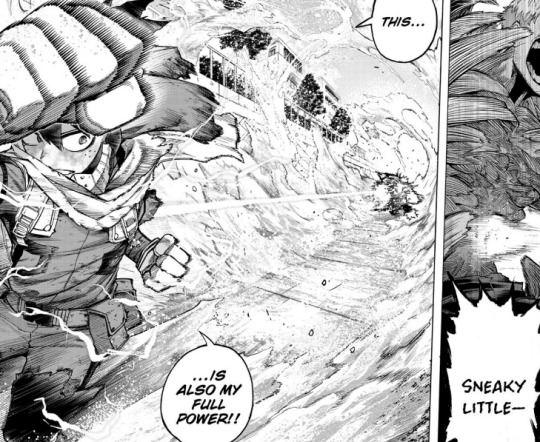
Well, if he’s failed in his goal of understanding a villain then does the story call him out on his failure? Does Deku face any sort of narrative consequence for that failure? Is he framed negatively for failing to understand Muscle, the same way that Judai is framed for abandoning Yubel? Nope. Deku doesn’t express any frustration at all over is inability to reason with Muscle. There’s also no negative consequence for Deku just choosing to punch muscle, it turns out that there was no reasoning with Muscle and some people are just bad eggs so Deku was right. It’s okay for characters to fail, but if a character fails and it’s not framed by the story as a failure then the writing itself as failed. Why even bother to include this scene in the first place if it doesn’t advance Deku’s character in any way? This scene in spite of showing Deku failing to understand someone actively paints Deku in a positive light, because of how much stronger he is ow that he can OHKO a guy that gave him trouble all the way back in the camp arc.
This scene doesn’t tell anything about Deku as a character, it just makes him look cool. In fact that’s precisely the problem, Deku isn’t adequately challenged as a character, because he’s never allowed to fail. Even when he does obviously fail at the things the narrative set out for him to do, he’s never challenged on those failures, because the priority isn’t to make Deku grow, it’s to make Deku look good. As I said before, Judai is the hero because he’s the weakest. Deku is the hero because he’s the strongest. Well, next a big flaw on Deku’s part is that he worshippd the same heroes that were making the world corrupt. Heroes like Endeavor who created people like Dabi. So, does Deku take action to either criticize the older generation of heroes, or separate himself from them in order to try to be better than them? Nope, he teams up with them. Not only that, Deku can’t do something as simple as tell Gran Torino out loud about his plans to save Shigaraki. If Deku feels that Shigaraki is worthy of salvation then he should at least try to make an argument here about his ideal of saving others.
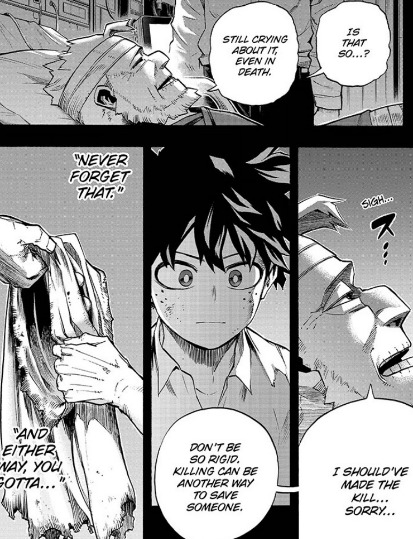
Now here’s the thing, if Deku hadn’t directly looked at the camera and told us he wanted to save Shgiaraki, would we be able to deduce his intentions from his actions? If you took away all of Deku’s internal monologue, and just showed him punching Muscular and saying nothing when Gran Torino says he may have no choice but to kill Shigaraki would anything about Deku’s actions indicate that he wants to save Shigaraki? Let me use avatar the last airbender as a positive example for a moment. People say that Aang’s desire to spare Ozai’s life comes out of left field, but like if you analyze Aang as a character down to their bending, and the way they react in situations they always prefer de-escalation, or taking a third option as opposed to confronting things head on. It’s literally why Toph says Aang has trouble learning earth bending, because as an airbender, he always tries to look for some other way to solve the problem, instead of a direct confrontation with force. As early as season one, Aang tells Zuko someone who has tried to kill him several times that he was friends with someone from the fire nation one hundred years ago and in a different situation they could be friends. Aang’s desire to save the Firelord may not have been told to us until the last possible minute, but Aang’s aversion to violence has always been a part of his character from the beginning. However, Deku never shows any similar aversion to violence. There’s basically no example where he ever tries to de-escalate a situation, or he avoids a conflict by seeking a third option.
Anyway, let’s move onto the next example. In the confrontation where Lady Nagant fights Deku, when Deku learns the fact that the heroes were employing government hitmen to attack people for uhh… exercising free speech does Deku give any reaction to this information? When Lady Nagant says that Deku is only going to bring back the status quo, does he show her any meaningful evidence that he won’t do that.
Deku’s response is because the world is so grey, he needs to extend a helping hand to others. Which you know what thay could be a response. Deku saying that his response to the corruption of the hero world is that he now understands that society led some people down the wrong path, so his way of addressing the wrongs of that society is lending a helping hand to as many people as possible even people he used to think was irredeemable.
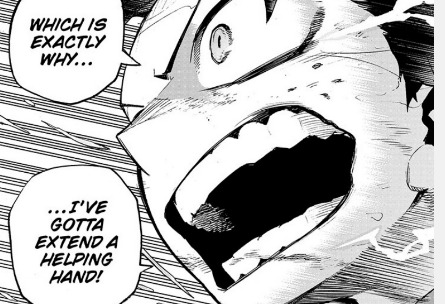
I will give Deku the benefit of the doubt, I think this is an acceptable answer. I can’t save everyone, but that’s not going to stop me from trying to save as many people as possible and maybe I can save people who were this society’s victims on the way too. However, does Deku demonstrate his resolve to extend a helping hand in any meaningful way.
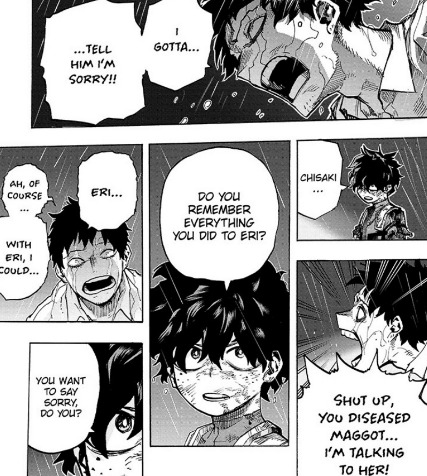
Deku is met with an armless, insane Overhaul who’s begging for someone to help heal his father figure in the Yakuza from his coma. This isn’t like Muscular who insists that there’s no helping him, Deku is met face by face with someone asking him for help. Deku’s gotta extend a helping arm whenever he can, because he knows some people were abandoned and led astray by this society… Unless that person is someone he doesn’t like personally. At which point he only helps them on a conditional basis. We are told Deku will save anyone and everyone, but Deku is met face to face with an armless man who is begging for help and Deku’s does nothing to help him. Deku’s not criticized for refusing to help overhaul either, it’s never brought up again. When Deku begins to experience a mental breakdown because of all the people he’s trying to help in the Dark Deku arc, we are told this is the result of Deku trying to save everyone, but we do not see Deku attempting to save a single villain after Muscular and Nagant.
He exhausts himself beating up villains that AFO sends after him, and only helping innocent civilians. Which would be fine if this arc were about how Deku is running away from his real responsibilities the same way that Judai was running, but that’s not what we’re being told. We are told that this is all part of an arc of Deku learning to understand villains and be a hero.
Deku is asked “Can you save Shigaraki?” by the story, but Deku never at any point has to deliberate on that question. Judai doesn’t deliberate on that question either, but him choosing not to think about things and stay ignorant is the point.
It’s actually fine to make Deku stagnate as a character. It’s fine to have him take the easy way out by just punching villains and giving up on them after one conversation. It’s fine for him to be empathetic to other people’s suffering, or even self-righteous. It’s fine for him to be ignorant.
He could be all of those things if it was a part of a narrative teaching him to unlearn his behavior. In fact the narrative might have been better if Deku started out by saying he didn’t want to save Shigaraki, that there was no choice but to kill him, because then at least his actions would be consistent with his words. Then his lack of empathy and his tendency to resort to violently beating up villains instead of avoiding violence would be character flaws he could work on. Deku however, is presented to us as this empathic hero who is always willing to give others a second chance though he never actually sticks his neck out in order to do so. Continuing on with our slow crawl through MHA, one of Deku’s friends is revealed as the traitor. Deku has a heartwarming scene fo saying that Aoyama can still be a hero, but look at his actions. He lets the adults in the room physically tie Aoyama in a straightjacket and imprison him, for the crime of… doing bad things while he was in a hostage situation. Apparently, if a bank teller helps the bank robber by giving them money when the robber has a gun to his head, the swat team should just snipe the bank teller. Not only does he not defend Aoyama against the adults, or stand up for him, or tell the adults they’re wrong to treat Aoyama a clear cut victim who had a gun to his head and was bing held hostage like he’s a villain - he also lets the adults use Aoyama an innocent victim as bait in order to lure out AFO. Deku tells Aoyama he can still be a hero, but he doesn’t defend Aoyama as a victim of being taken hostage, nor does he stop the adults from further taking advantage of him and throwing him right into danger. Some people are just led the wrong way that’s why they need to be extended a helping hand, but fuck Aoyama I guess. He needs to earn the right to be sympathized with by physically putting his life in danger.
Deku can’t even go out of his way to save a friend who he’s known for the better part of a year, when that friend is a complex victim forced to do bad things.
Then Deku and Uraraka have a conversation where they both, kind of ruminate on the idea that maybe the villains are human beings who are worthy of sympathy.
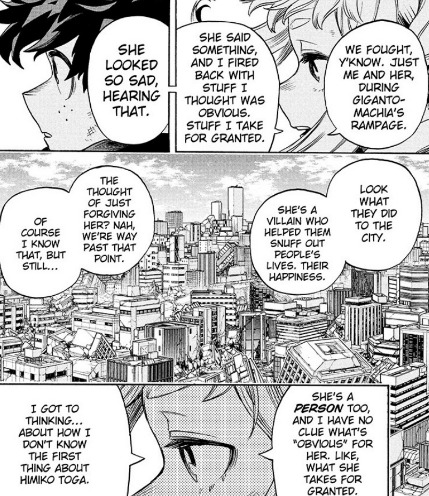
In fact Uraraka is actively trying to dehumanize Toga by looking at the destroyed city, so she won't have to think of Togaas a person.
The language here is also a major fault of this arc. It focuses far too hard on “forgiveness” over and over again. As I said before, saving Shigaraki isn’t about Shigaraki at all, it’s about Deku, and how he wants to use his power as a hero. Deku has even stated himself that he doesn’t believe that OFA is a power that should be used for killing people. So why does whether Toga or Shigaraki are forgivable or not even matter? It’s the same with Deku refusing Overhaul any sympathy. If he’s so morally opposed to abusers, then why does he work with Endeavor and defend him at every visible opportunity, even in front of his victims? Whether or not Deku can forgive Shigaraki doesn’t matter, because Deku is not the moral arbitrator or right and wrong. In fact Deku doesn’t even have any morals, so how is this a moral debate? Is there any point where Deku gives a clear definition of what he thinks right and wrong is? Does he quot Immanuel Kant to the audience?
Batman doesn’t kill people, not because he thinks that every last person on earth can be saved, but because Bruce Wayne an incredibly rich white man thinks that maybe he shouldn’t have the authority to decide who lives and who dies. When Bruce doesn’t kill the joker, it doesn’t mean he thinks the Jokers actions are forgivable, it’s because Bruce thinks it’s not his place to determine whether someone has the right to live.
The whole conflict that MHA presents us is that heroes pick and choose who to save, and only save the ones they deem as innocent. So, how does Deku saying repeatedly they can’t forgive Shigaraki contribute to that theme in any way? In fact by focusing on forgiveness, rather than whether or not he personally has the right to pick and choose who lives and who dies Deku is ignoring the elephant in the room. The question isn’t about whether Shigaraki’s redeemable or if his deeds should ever be forgiven. The question is whether Deku has the right to decide who gets saved and who doesn’t.
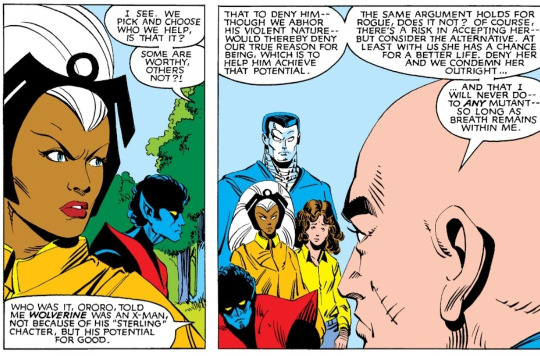
We are told that Deku as a character is someone who wants to save everyone no matter what, so Deku shouldn’t be focusing on whether or not Shigaraki is worthy of forgiveness, he should be making an idealistic argument like Xavier does in this panel. Why doesn’t Deku talk out loud with Uraraka on how he believes his power is for saving others, and not killing? If he’s meant to represent some idealistic hero, then why doesn’t he even talk about his ideals? Why don’t I as the reader know what those ideals are?
I think Xavier’s ideals of forcing the X-men to provide a good example to the mutant community, in order to try to earn the respect of other human beings is wrong, but at least he has ideals. He tries to inspire the other people around him to live up to those ideals. The story can criticize him for his ideals and point out how they’re wrong, while it can also uplift parts of his idelogy like where he believes there are no evil mutants. Deku has a chance to do the same to Uraraka, to tell her clearly, “I don’t think we as heroes have the right to pick and choose who we help…?” but he waffles. Not only does he waffle, but this moment is meant to be read as an indication that both Deku and Uraraka are sympathetic individuals who want to save their villains. They are supposed to look good and idealistic here and they don’t. For Deku it just seems like a repeat of his behavior with Overhaul. The only villains that are worthy of sympathy, are the ones that he personally decides are forgivable.
The story isn’t about whether or not it’s moral to save someone who’s killed as many as Shigaraki has. The story never seriously discusses any sort of complex morality or moral philosophy. Once again to bring up avatar, yes you can argue Aang sparing the life of a war crimminal is bad, but Aang mentions on multiple occasions that he wants to retain the cultural values of the airbending people. Aang has a morality, a consistent morality, it might not be a morality you personally agree with but at least he has one. Deku hates abusers, unless he’s next to Endeavor then he thinks abusers should be given the chance to atone. Deku doesn’t believe that One for All is a power for killing, but he never stands up to any of the adults who are blatantly trying to kill Shigaraki, he doesn’t even express out loud to Uraraka that he doesn’t think heroes have the right to decide who lives and who dies. In fact he’s given the perfect opportunity to, when Hawks kills a villain and it’s broadcast live on the news in font of everyone, but Deku never has anything to say about that. The reason Deku and Uraraka both put such an emphasis on “forgiving” their villains has nothing to do with the story itself. It’s because the author Horikoshi, is afraid that some people will misinterpret his story as saying that he actually thinks that saving a villain like Shigaraki means that he condones mass murder, so he has to have the characters talk about not forgiving Shigaraki.
Judai doesn’t have any consistent morals either, but once again that’s the point and something the story relentlessly calls him out on.
Cobra: Fortune would never smile on a fool like you who fights while prattling on about enjoying duels. Cobra: You are certainly a talented duelist. But you have one fatal flaw. Judai: A fatal flaw? Cobra: Yes, your duels are superficial. Someone who fights with nothing on his shoulders, cannot recover once he loses his enjoyment. What a duelist carries on his shoulders will become the power that supports him when he's up against the wall! Cobra: But you have nothing like that! Those who go through life without anything like that cannot possibly seize victory. Cobra: But I know that nothing I say will resonate with you... because you have nothing to lose but the match. Judai: I... Cobra: Afraid aren't you? Right now, you have nothing to support you.
Judai’s regularly called out for his superficiality. Judai is only a hero because he’s strong and wins fight, he doesn’t feel any responsibility towards other people, and in fact he loathes having to feel responsible for others. Judai isn’t just naive, he deliberately chooses to remain ignorant. Since he’s ignorant of his own faults, he makes awful decisions when it comes time for him to lead, and his friends die because of choices he made. We are told that Deku doesn’t want to remain ignorant, that he wants to understand villains, but Deku’s actual actions are him continuing to ignore society’s ills and the suffering of victims. In fact if you take away Deku’s internal monologue and the narration, Deku’s actions almost exactly mirror Judai’s.
Deku is just as superficial as Judai, and he also doesn't want to spend any time thinking about what kind of hero he wants to be, but the narrative never punishes him for it.
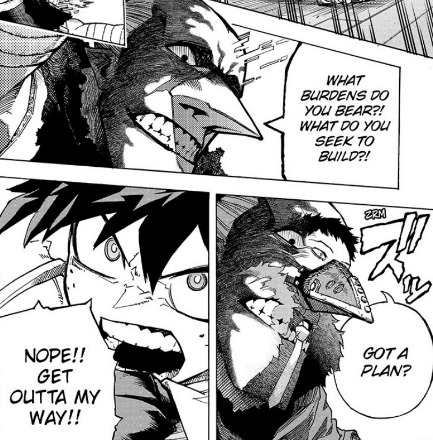
Judai is asked what burdens he has to bear and he has to meaningfull answer that question, Deku is allowed to get away with not having to think about anything. Deku remains superficial. Both Judai and Deku spend the entire arc running away from their villain rather than confronting them in any meaningful way. They both never express out loud any sympathy for their villain, or try to empathize. THey both never step down from the role of hero, and only confront their villain as a hero, because they don’t want to think about themselves as complicit or in the wrong. Shigaraki and Deku’s final confrontation mirrors Judai and Yubel’s but without the same clear framing. THe entire time Yubel is trying to get Judai to empathize with them, and Judai only responds with physical violence, because they don’t want to stop being the hero and because they can’t see Yubel as anything other than the villain. As soon as Deku arrives on the battlefield (by the way everyone else and their mom pointed this out, but Deku who doesn’t think OFA is a power for killing, is completely okay with a plan called the “Sky coffin plan” where every other hero was clearly trying to murder Shigaraki).
When Deku arrives he asks if Shigaraki is still in there, but he doesn’t do anything to try to reach Shigaraki, he jumps right to punching him. In fact he never tries anything besides punching him as hard as possible. How is punching Shigaraki with the force of a thousand suns saving him exactly? How is that different from how he tried to defeat Shigaraki the last war arc, before he saw the image of the crying child that made him want to try a different approach in saving Shigaraki? In Judai’s final fight with Yubel, it’s made explicitly clear that Judai is not trying to save Yubel, and that’s a fault on his part. In fact Judai gives the traditional “I have friends, and you don’t” speech to Yubel but it’s a subversion of how that speech is usually used. Usually that speech is used to show that the protagonist won because of they valued friendship,while the villain treated their friends poorly and only cared about power. However, it’s ironic in this case because Judai got all of his friends killed. Judai treats his friends like garbage. This speech isn’t used to show that Judai is winning because he values his friends more than Yubel does, it shows that Judai is a hypocrite, playing the hero in this situation where they are just as bad as Yubel. Judai’s not morally superior, he’s just lucky that he has good friends. Friends that were willing to save him. The only connection Yubel has to anyone else, Yubel’s only friend is Judai and Judai is a shit friend.
In fact, Mirio tries to give a version of the “You don’t have any friends” speech to Shigarkai, only for Shigaraki to get mad and tell Mirio that he does have friends and people he wants to protect.
This fact is also something that is blatantly ignored by Deku, even though Mirio tells him about it… even though we are told that Deku is trying his best to see the humanity in Shigaraki.
Judai blatantly admits they’re trying to kill Yubel. Which makes them a worse person, but a better character than Deku, because their actions are clearly framed by the narrative and consistent.
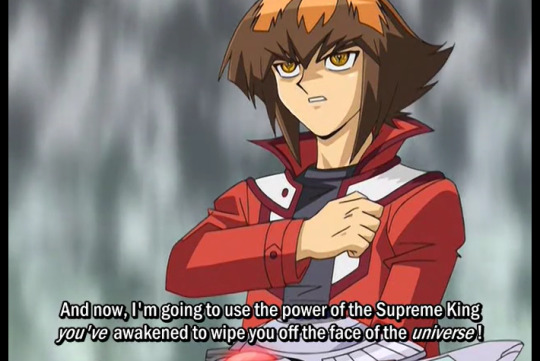
On the other hand we are told that Deku doesn’t want to kill Shigaraki, and yet everything Deku does makes it look like he’s just trying to kill Shigaraki and put him out of its misery. If we didn’t have Deku stating out loud that he wants to save Shigaraki and wants to see him as a human, there’d be nothing in his actions to indicate that he’s trying to avoid killing Shigaraki. Deku says he can’t pretend he didn’t see Shigaraki crying, but like, does he ever hesitate to punch Shigaraki, does he ever think that causing Shigaraki more harm is wrong when he’s already suffered so much? Deku says that Shigaraki is a person but does he treat him like a person? Does he try to talk to him like a person? To use avatar again, Aang does talk to Zuko pretty early on. Deku doesn’t even give the classic “We could have been friends under different circumstances” speech. When Shigaraki resists Deku’s attempts to see him as a person or emapthize with him, Deku’s response is to just resort to punching harder.
Which is in effect the same thing Judai does to Yubel, just kill them as a villain so they don’t hurt anybody else, but framed in an entirely different light. Judai is shown to be ruthless, and cold in his attempt to only settle the conflict with Yubel by violently putting them down. On the other hand we’re being told that Deku is compassionate and empathic while he punches Shigaraki with the force of a thousand suns.
There’s another eerie similarity between both of these final confrontations. At the climax of the confrontation, both Judai and Deku have a psychic vision where they see events from Yubel and Shigaraki’s childhood. This vision is supposed to help both characters understand the good in the villain they’re facing.
Let’s see the contents of this vision and how the visions change each character. Judai is shown a vision of his past life where Yubel sacrifices their entire body, and even their humanity to go through painful surgery to turn into an ugly dragon, all for the sake of protecting Judai in a previous life.
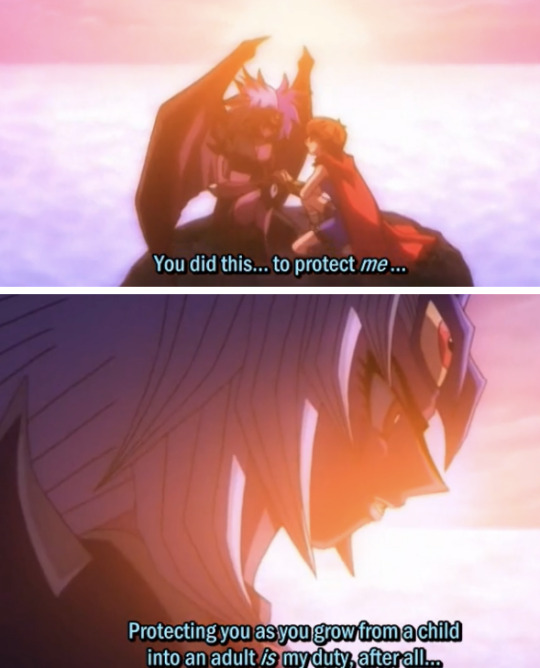
Judai is then forced to witness the good side of Yubel they’ve been ignoring all along to paint them as a villain. Yubel is simultaneously extremely selfish and willing to hurt people Judai cares about, but they’re also extremely selfless and will do anything to protect Judai and have made great sacrifices in the past for Judai’s sake. Deku gives lip service to not ignoring the humanity in Shigaraki, but Judai is literally forced to acknowledge the humanity in Yubel. Not only that, but Judai changes his behavior immediately after learning this new information. After seing the sacrifice that Yubel made for him in the past, Judai responds with a sacrifice of his own. A sacrifice that perfectly mirrors the sacrifice that Yubel once made for him. Yubel gave up their humanity for Judai, so Judai fuses his spirit to Yubel’s, becoming a human / spirit hybrid so Yubel no longer has to be alone.
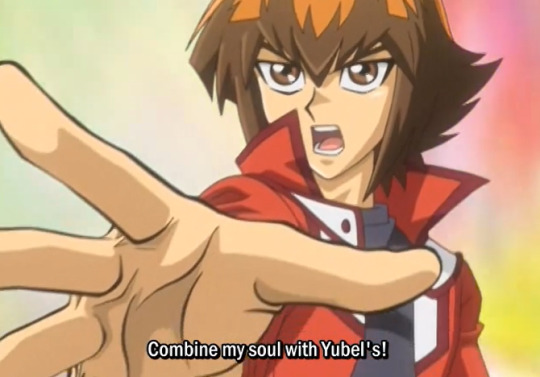
Judai also doesn’t just fuse their soul with Yubel’s in order to stop Yubel from destroying everything, it’s because both of them at this point need to atone together, and Judai is fulfilling his responsibility of watching over his friend until the end to prove that you care about them - as he said to Sho. Judai’s also fulfilling Johan’s dream of helping repair the bonds between spirits and humans, by reconciling with Yubel and repairing their bond. It’s also Judai atoning for his previous behavior of abandoning Yubel, by choosing to stay alongside them as they both atone together. Deku does sacrifice OFA during the fight against Shigaraki, but their sacrifice isn’t to help Shigaraki, but rather doing psychic damage to Shigaraki by using OFA is the only way to defeat them. He transfers OFA in order to break Shigaraki’s brain so he’ll stop reissting and Deku can beat him down. Judai fuses their soul together with Yubel out of empathy and a responsibility they feel to help their friend fater abandoning them, Deku transfers One for All to Shigaraki in order to hurt him and make him easier to punch. It's funny that Deku doesn't travel to Shigaraki's mind to learn more about him, but instead with the specific intent of harming him.
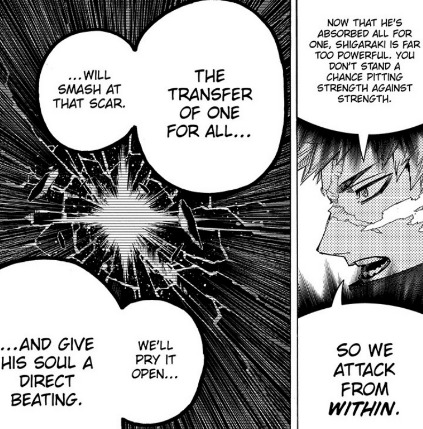
Once he's inside Shigaraki's mind, he doesn't take time to reflect on how Shigaraki used to stand up for bullied kids, or how he wants to be a hero to villains because no one else will stick up for the outcasts in society. No, he only care about Shigaraki when he takes the form of a child crying for help.
In the aftermath of the psychic vision Deku’s behavior doesn’t change towards Shigaraki in any way either. You could say he sacrificed his own arms in order to try to comfort Shigaraki within the depths of his own mind - but that’s not a real sacrifice either because his arms immediately come back. When Judai learns about the sacrifice that Yubel made in a previous life towards him, he stops seeing Yubel as an enemy and finds a way to resolve things peacefully between them. When Deku lanterns that Shigaraki’s a victim of All for One, and that his entire life was a lie, when he sees Shigaraki’s suffering first hand does his beavior twoards Shigaraki change in any way?
When he sees Afo has taken over Shigaraki’s body again, does he try to shout for Shigaraki, to tell Shigaraki to fight from the inside, to reassure Shigaraki that he’s still in there that there’s still good in him? Nope. He just punches Shigaraki some more.
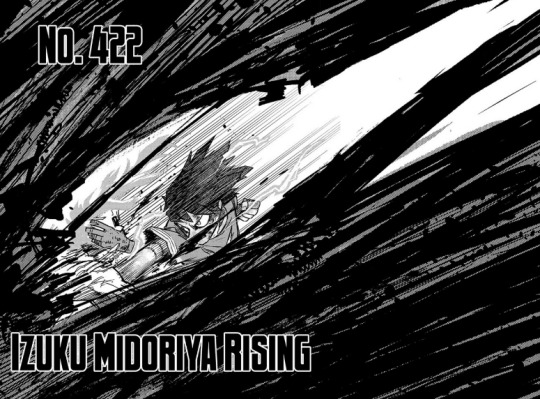
What Deku needed to tell Shigaraki is so obviously set up by the narrative too. Shigaraki wanted just one person in that house to tell him he could be a hero. Deku wanted his mother to tell him he could be a hero if he was quirkless. Deku sees that Shigaraki started out as a boy who wanted to be a hero, and who was manipulated into being a villain but does he try to appeal to the boy inside of Shigaraki by telling him he can still be a hero? Does he now see the good in Shigaraki? Nope, he just tries to kill him by punching him really hard.
I purposefully chose the images for the banner of this post, because it shows how differently MHA and GX treated its villains in the end. Yubel is embraced by Judai in the end, Shigaraki evaporates into dust.
"Judai, now that our souls have become one we will never be separated again. I have now been filled with your love and power. Let us fight together, against the wave of light leading this universe to destruction!"
Shigaraki could so easily have been given the love and empathy that Yubel was shown, but instead their life ends with no show of empathy from Deku, and with them dying believing that their long life of tragedy meant nothing in the end. Shigaraki realizes he's a crying kid, but he's never comforted.
Shigaraki: I only stole my body back from Master, and I didn't destroy anything. "In the end, I was just as you said... A crying kid, huh?"
Yubel is embraced and comforted, Shigaraki disintegrates into nothing.
One of these stories is apparently an optimistic story about heroes saving people, but it ends with the lifelong victim being killed in the most nihilistic manner possible, never receiving comfort, and never achieving anything with his long life.
The other story is a silly anime about card games, shows that when people are alone and suffering they can lash out and do terrible things. That all people are weak especially when they're alone, but the solution isn't to abandon them, or condemn them for their faults, but to believe in them and help uplift them the same way that Judai decides to uplift Yubel so they can atone together.
Which is why Deku gets an F in being a hero. Go directly to summer school. Do not pass Go. Do not collect $100.
#mha meta#ygo meta#mha 423#bnha 423#mha 423 spoilers#bnha 423 spoilers#izuku midoriya#deku#shigaraki tomura#tenko shimura#judai yuki#yubel#soulshipping#yu gi oh gx#yu gi oh
741 notes
·
View notes
Note
I really hope this doesn’t come across as rude, but why did you decide to make Lex Luthor, whose motivation is basically racism and xenophobia from my understanding, a person of color? This isn’t like, a criticism, more just, I really like your JL remix stuff and you usually have cool reasons for the stuff you change, so I was surprised by this one
I understand the curiosity! But I have to point out that "you usually have cool reasons for the stuff you change, so I was surprised by this one" made me laugh, haha. Long answer coming because I have a lot of feelings- but the point in the very end is worth it, trust me.

So for one, Lex is Afro-Greek in my version. This comes from the popular headcanon that STAS/DCAU Lex is Black (and his design is based on a Greek man). His character design, skin tone, and Clancy Brown's enigmatic performance became unintentional perceived representation for Black fans (and even DC writers). And now in the Harley Quinn show, that's become canonized! For why they like it, that's not my place to say as a non-Black person- so I listen!

I don't agree that Lex's motivation is "basically racism and xenophobia"- his themes are much broader than that. It's the desire to be the Man of Tomorrow, his jealousy of Superman, the way his intellect alone is a match against Superman's strength. Sometimes that jealousy is expressed through bigotry, but it's all a means to an end for Lex. My approach is: if Lex being Black is something we want to integrate more into his character, what opportunities does that open up narratively? Because there's rich potential for him and the characters connected to him.
When discussing MAWS I talk a lot about how when you're writing a bigoted marginalized character, there needs to be specifity with where that internalized bigotry is coming from. So a change like that for Lex Luthor could, for example; discuss how privileges like wealth can assimilate otherwise marginalized people into the kind of power that harms others in their community.
The ripple affect this has on a character like Superboy/Conner is that we get to see how -even though they're both Luthors- Conner is profiled, othered and further marginalized as a Kryptonian and a Black homeless teen because he doesn't get to benefit from any of Lex's privileges. This is just part of the many reasons why I think Conner would be infinitely more interesting if he didn't look like Kal El despite being a clone. You get to see a new intersection of how the Kryptonian identity intersects with Blackness on Earth. The potential ripple effect for a character like Lena is also really fun! What if she's struggling with her own model minority pressure when she's making up for her brother's crimes? It's all very compelling!
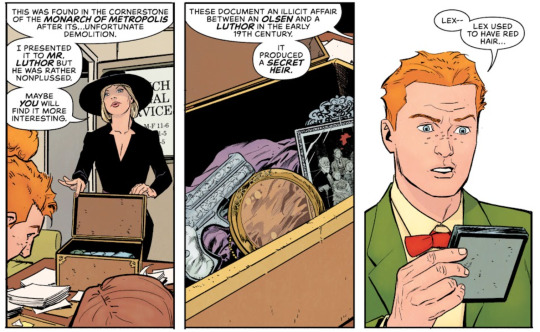
And MOST importantly, in a 3 trillion IQ Lex Luthor-style move-making Lex Luthor Black means that some version of Matt Fraction & Steve Lieber's Superman's Pal Jimmy Olsen arc exists in my au. Which famously hinges on the twist that LEX LUTHOR AND JIMMY OLSEN ARE DISTANTLY RELATED. THEREFORE!!! We have now found a convoluted way to have Wacky Renaissance Artist Jimmy Olsen connected to The Manifestation Of Black Excellence Evil Edition Lex Luthor in this au.
#askjesncin#jesncin dc meta#lex luthor#remember how in Crazy Rich Asians the inspiring moral was “u can transcend racism with ungodly wealth”#when that should be dystopian actually#also Lex being Black isn't “marginalized evil person” trope when he isn't the sole Black person in the Supers cast#the weight of representation isn't placed on one character- so why not have some evil ones for a variety of reasons
278 notes
·
View notes
Text
In Defense of The Super Mario Bros. Movie

Last year, Nintendo collabed with Illumination to bring their Italian plumber mascot to the big screen. It was an audience favorite, grossing $1.362 billion at the box office, becoming the highest grossing video game adaptation of all time. And yet, most professional critics passed it off as adequate at best children's entertainment, with a large number of them denouncing it as style over substance. Being an animation fan, a Mario fan, and a storytelling fan, I'm of the opinion that The Super Mario Bros Movie...is a cinematic masterpiece! Yes, you read that correctly. I absolutely love this movie both from a fan perspective and a narrative perspective. That may sound like hyperbole, but by the end of this post, I hope you'll understand where I'm coming from with my bold statement.
Based on the games, The Super Mario Bros. Movie tells the origin of Mario and Luigi entering the Mushroom Kingdom, meeting up with Princess Peach and facing off against Bowser. One aspect of the film that is often seen as weak is its story. I think the filmmakers made the smart choice in making this a classic Hero's Journey plot with Mario having to overcome adversity and prove his naysayers wrong. Not only does this make him more relatable, but it also prevents the film from overloading itself with superfluous subplots and tiring exposition dumps found in lesser media. I really appreciate that the film took it's time organically building the world with natural dialogue, visual gags, and letting scenes speak for themselves. This is especially true with the scene in which Peach tells Mario how she got to the Mushroom Kingdom. She only gives some brief insight into her early life while the visuals do most of the talking, and it ends with Toad playing the flute in tandem with the score. If this were as generic or formulaic as detractors say, they'd undercut this beautifully crafted scene with an unfunny joke. That's not to say the humor is cringe; quite the opposite, actually. This film is full of gut busting jokes and visual gags, such as Bowser slamming the keyboard cover on Kamek's fingers, Mario frequently failing the obstacle course, and that vicious dog attacking Mario and Luigi in the beginning. The film is chock full of hilarious gags that are well set up and have excellently timed punchlines. What makes the film's story resonate with me is it theme of never giving up. No matter how many times Mario fails, he never gives up and keeps trying until he succeeds. This is a very well good message to send to audiences, especially children. It's also well handled by being shown through Mario's determination and bravery. There are many films that follow the Hero’s Journey plot, but The Super Mario Bros. Movie is one of the finest examples in modern cinema.
The characters are all very well handled and are brought to life by such a great cast. Many were skeptical of Chris Pratt voicing Mario, given that we're so used to this iconic character being voiced by Charles Martinet in the games. That said, Chris Pratt more than did Mario justice, making him sound like a brave, sarcastic, and resourceful Brooklyn man. Charlie Day also did a great job voicing Luigi, making him sound cautious, funny, and kind. Anya Taylor-Joy did a great job voicing Peach, making her sound smart, funny, and brave. Keegan Michael-Key deserves major props for giving Toad a distinct yet memorable voice that makes him sound brave and funny despite being on the smaller side. This is because Toad in the games sounded like a woman putting on a gravely man voice, which especially works best in small doses and not in a full-length feature. The true MVP of the cast, though, is Jack Black as Bowser. This was perfect casting, and Jack knocked it out of the park. Bowser was fierce, menacing, and boisterous, yet also a true try hard when trying to impress Peach. I especially love his song, Peaches, which only works because Jack Black fully commits to it. All the other actors did such a superb job voicing their characters, including Seth Rogan hamming up his frat boy personality for Donkey Kong, Fred Armisen as the aptly named Cranky Kong, Kevin Michael Richardson as Bowser's kiss-up wizard Kamek, and co-director Michael Jelanic's daughter, Juliet as the sadistic but sweet sounding Lumalee. The characters were all so well realized and excellently cast, especially Jack Black as Bowser.
Illumination doesn't get enough credit for having some amazing animation in their films, especially in this film. They really outdone themselves, translating the world and characters from the Mario games into a full-length feature. In addition to giving them being, expressive eyes, distint body sizes, and very well detailed textures, they also give them unique character animations, like Mario walking more confidently than Luigi or Bowser stomping with every step he takes. The animation is especially well utilized during the action scenes, with great uses of squash and stretch, anticipation and follow through, and blink-and-you-miss-it gags. This is best showcased than in the Rainbow Road sequence which is full of all the aforementioned animation beats, including Mario punching Donkey Kong's should congratulatorily and DK being taken a back by it, the Koopas eating Peach's foot to the face, and the iconic Blue Shell attack. The animation makes this film feel as grand and as exciting as the games that inspired it.
The score and soundtrack also deserve credit for honoring the original game music and having a great selection of tracks. Composer Brian Tyler made great use of the iconic character themes, the Mario Bros. Rap, and the victory theme from previous Mario media in the score for the film. The film also utilizes pop tracks from the 80s that not only make for great montage music but also fit really well with their respective scenes. This is especially true with Holding Out For A Hero during Mario's platforming trials, Take On Me foreshadowing Mario's battle with Donkey Kong, and Thunderstruck building hype while the characters are building karts. I also can not praise Peaches enough for being such a well-made and funny track sung brilliantly by Jack Black. The soundtrack does a great job combining old music with new, making a very well put together symphony.
Nobody went into The Super Mario Bros Movie expecting a masterpiece, not even me. Yet after several rewatches, I feel the same about the film as I did when I first saw it. This is a masterfully crafted film that not only honors the video game franchise but is also a great fantasy film on its own. With organic world building, smart pacing, a great cast of characters, hilarious gags, and a fantastic score, this is very much the definitive Mario film and the best film based on a video game thus far. Thanks for reading, and I'll see you next time ;)
#reblog#share#like#follow#animation#comedy#illumination#super mario bros movie#chris pratt#charles martinet#charlie day#anya taylor joy#jack black#mario#luigi#bowser#princess peach#toad#keegan michael key
25 notes
·
View notes
Text

I'm once again departing slightly from tradition with my December review. First, and least importantly, the poor image quality! I forgot my proper camera at work and had to bring this book back to the library, so ended up using my phone in artificial light. I've tried to clean it up some, but … yeah, it's not great. I know.
More importantly, this is a series review, not a book review. I don't feel right saying, "read part three!" when parts one and two are just as good and you'd be missing context without them. Which is sort of weird to be saying about history books, maybe, but there you go.
So, basically, the History of Ancient Egypt books by John Romer are the Egyptian history books to read, especially if you like academic histories, big picture narratives, archaeology, or decolonizing the past. They're detailed but readable, seem comprehensive in terms of sources, and are nearly as concerned with tracing the history of the "common knowledge" about Egypt as they are with describing cultural shifts within ancient Egypt itself and with busting myths.
Yes, "academic" here does mean densely informative. Each book is trying to cover hundreds, if not thousands, of years, after all. However, Romer is keenly aware of that and also aware that he's writing for a lay audience. He's warm, concise, and direct; never wanders off topic or too far down any particular track; provides copious illustrations; chooses his examples for maximum effect; and breaks down facts and misconceptions plainly. There are also anecdotes and other humanizing moments, loving descriptions of artworks, translations of ancient writings, and other moments of bringing the past to light and injecting some lightness. It might be occasionally slow, but it's far more readable than it could be.
Romer is also rigorous, in the way of a good historian. His focus is on what we truly know, what we can glean from Egyptian writings and art and other aspects of material culture, and he's good about pulling back from and pointing out the Western lens at every turn. So, he'll talk about the training and knowledge and labour that lies behind a sculpture or temple, he'll talk about the continuity of form from the Old to Middle to New Kingdoms, and he'll talk about what that says about cultural values and social organization—and then he'll bring up a 19th-century European who looked at that art and saw an ancient Napoleon or slave labour or proto-Christianity, because that European couldn't see outside his own context.
And because of Romer's focus on the archaeology, this ends up, like I said, as a big picture sort of history. There isn't much we can know about a lot of the pharaohs, let alone daily lives of other individuals, because so much time has passed and so much was never recorded. (And trying to build granular history from what's known is, as he points out, fraught, since so much Egyptian writing was formulaic and over-dramatized.) What we get instead is shifts in artistic and architectural techniques, shifts in the location of royal residences and tombs, more art vs. less art, first appearances of formulae that echo down the ages, signs of trade and international connection, and the like. Major pharaohs are mentioned, of course, and their dramatic Westernized personalities, but those also, he pares back. Yes, Akhenaten came up with a new god and apparent monotheism. No, he didn't "dictatorially force it" on the population.
Which is not to say that Romer's perfect in his stance. There have been moments in every volume where I've wondered if he's still making assumptions, or if he's backed up by the research in his bibliography and just not writing down his full reasoning. (At least some of this has to do with art criticism. Does a change in imagery or style really mean what he says it does?) There are also moments when I feel like he could stand to speculate a little more than he does, like the period near the end of this latest volume where the tombs get rushed and the tomb-builders are assigned to different projects. In other places in the books, he comments on how interesting of a shift X is, what X tells us about priorities, what forces might have prompted X—but he doesn't here. He just states facts.
(Is this me putting my own Western bias to work? Or me just wanting to know unknowable things? Entirely possible, on both counts.)
I do definitely, though, applaud Romer's commitment to decolonizing ancient Egyptian history. There has been a lot of speculation, a lot of sloppy and wishful thinking, and a lot of racism/orientalism at play in the last 250 years, after all, and it's lead to an image of Egypt that isn't substantiated. It's not just the great events, either, like Hatshepsut's "usurpation" and the "Great Man" Ramesses II and the "Sea Peoples" who seem to have been, as individual people groups, already living in the area. Romer also points out that you can't have a "market" if you don't have money, you can't have a "marriage" if you don't have weddings, and you can't map 4,000-year-old armed conflicts like you would the Battle of Waterloo (for one thing, the army is a lot smaller, no matter what pharaoh claims). A whole section of Volume 2 addresses the early French and German egyptologists and their motives, part of Volume 3 is dedicated to attempts to pinpoint the people and places of Exodus, and there is much sadness throughout the series at the roles poverty, looting, and tourism have played in the loss of the archaeological record.
So, while the series isn't entirely perfect, as I've mentioned, I find it difficult to imagine anything better, and these books feel much more complete, accurate, and grounded than a lot of the more popular histories I've come across (Egyptian or otherwise). Romer talks about craftspeople at least as much as priests and royals; blends hard dates and names with social history, geography, and historical climate studies; lays out massive amounts of information without being muddy or overwhelming; is committed to pointing out the flaws of the founders of his field; and humanizes his ancient subjects when it's possible to do so. It's masterful and impressive and clearly the result of a life's work. I want more people to read it, Egypt buffs or not. Some of Romer's points about what's knowable have stuck with me since Volume 1, which at this point is a decade ago, and this has become one of those histories I compare others to.
I sadly suspect this is the end of the series, but if it isn't, I'll be excitedly reading Volume 4 as soon as I can get my hands on it!
#books#book reviews#booklr#history#ancient egypt#a history of ancient egypt#john romer#bookblr#adult booklr#read in 2024#book recommendations#my photos
13 notes
·
View notes
Note
Hello, long time lurker and fan of your analyses here. There is one thing that I've been thinking over in relation to how people in the fandom react to Salem, that I'm puzzled with.
I followed one blog because of their posting about a game, and the villain of the game have extraordinarily similar circumstances to Salem, and that got me reflecting...
Both of them had tragic circumstances (or at least, implied), both of them were "corrupted" by "dark creatures" and considered "evil" because of it, both were betrayed by loved ones and both had their faith in the gods shattered and rejected them and deride divinity, but I see that there is much more analyses, understanding and sympathy for the guy than for her.
He wasn't portrayed to be very sympathetic in the game (in fact, he wasn't that present, showing up mostly at middle-end) and most of his characther was informed by a movie and a dlc, and yet...
Why would that be? It is because gamers are more prone to sympathyze with villains? It's because Salem's a woman, or that people are more willing to see depth in video games than in animation? It is lack of media literacy?
Thank you for your time!
it’s gender. mostly
(*without knowing the other story it’s difficult to say how much narrative framing contributes to the disparity, but framing can have a significant influence; by this i don’t mean whether the character is portrayed sympathetically per se but more, whose perspective do we see? what details are given focus?
salem as a character has been kept extremely opaque—the lost fable is narrated from ozpin’s perspective so we don’t really know why she does anything, we only know why ozpin believes she did everything; to understand her v1/v3 soliloquies we need context given in v6 and arguably v9 before it’s possible to start piecing together what she’s really talking about / what she really means, etc—and that’s something rwby does on purpose, because it’s Making A Point about the power that storytellers have over their audiences, and truth being more difficult to come by than asking for just one side of the story.
which has the effect of making salem a difficult character. the thematic point the story is making with her character is that it is really, really easy to fall for dehumanizing propaganda if that’s the only source of information you have. to see beneath the surface with her you really need to pay close attention to what she says and does and be very skeptical of what other characters say about her, including the authoritative spirit of knowledge [i.e. you need to pick up on ruby only asking specifically for ozpin’s side of the story AND that it’s never stated by anyone that jinn’s answers are objective factual truth AND that the lamp probably works like the staff in that she answers the exact wording of the questions put to her]. because the narrative we’re getting about her is heavily steeped in in-universe propaganda designed to convince people that she’s an unreasonable, deceitful, supremely manipulative and malevolent, inhuman monster.)
<- but with that being said. fandom is always much more critical of female characters than male ones, and it tends to be much more difficult to persuade a fandom to dedicate this level of interest and energy to a female character than a male one. you can see this in action even within just the rwby fandom: compare the fan reception of raven vs taiyang, for example, with leaving her child in the care of two loving parents because she felt unable to take good enough care of yang being styled as the worst most horrid unforgivable thing a mother could do whereas letting his five year old "pick up the pieces" is often… flat out ignored in favor of headcanon that he’s the best dad ever.
or just the fact that the vast majority of the fandom regards the lost fable fight as "salem murdered her kids, ozma died trying to protect them" even though that is explicitly contradicted by what’s shown on screen with both ozma and salem being equally aggressive and oz having no idea what happened to those girls from the instant the fight began because he wasn’t thinking about them; they BOTH killed their kids in their fury at each other. but the fanon is that salem murdered her children on purpose in a vengeful rage and ozma was a good dad—in its most extreme form this becomes the Dadpin Nonsense.
(there is also an extremely funny talking point in dadpin circles to the tune of "if ozlem were gender-swapped no one would question that salem was abusive!" as if a) tauradonna shippers who scream and cry about blake being abusive don’t exist and b) dadpin people wouldn’t eat ozpin alive if he was a woman)
it’s complicated by the reality that salem does do a lot of very horrible things—terroristic attacks, enabling a serial killer by using him as her attack dog, her abusive treatment of cinder, everything she does to lionheart, sacking atlas, razing vale—and her moments of restraint or mercy are very easy to miss (she actively disguises her own release of her hostages in 8.9 for example) and again you have to be very attentive to detail to pick up on the fact that she cares about cinder. so it isn’t like she has an obvious "good side" juxtaposing all the atrocities, which means except for those who make a conscious decision to try to figure out what’s going on in her head while keeping an open mind, no one is going to see anything but the atrocities.
and again, fandom in general is a lot more willing to do that with male characters than female ones.
i think the clearest sign that It’s The Misogyny is the sheer amount of extremely widespread, extremely entrenched fanon there is about salem that is straight up contradicted by the text. her supposed "disdain" for humanity, for example; people act like it’s outrageous and nonsensical to suggest that salem thinks highly of humankind in the abstract (despite her indifference to individual people) even though… in both of her soliloquies she speaks quite highly of mankind… or her supposed "obsession" with magic, never mind that she barely uses "real" magic herself (most of what she does is Grimm Stuff, and she uses dust to make her grimm battlewhale fly) and never mind that she keeps flat out warning cinder that magic "comes with a cost." etc. this is a kind of flanderization driven by people disregarding what she says/does and mentally inserting generic villain tropes to fill in the gaps of story they miss by doing that, and then these ideas become memetically repeated often enough that they become the accepted lens through which everything she does is refracted.
(and that is how you get nonsense takes like "salem calls emerald’s semblance a semblance because she’s furious that this pitiful imitation of REAL MAGIC somehow fooled her, not because 'semblance' is what that kind of magic is called." this is why salem’s the only adult character who’s read as condescending and disdainful when she refers to the 17-19 year olds as children, even though all the older adults and some of the teenagers themselves do that. etc. there’s a preconceived notion that salem is disdainful of humanity and the text is bent to fit that reading even to the point of creating the absurd double standard that it’s… wrong for salem to use the same language used by every other character in the story?)
this kind of sexism is covert and usually subconscious; it emerges out of disinterest and an unexamined reflex to read female characters as less competent / less moral / less complex / less trustworthy / less rational etc. than their male counterparts, often with a side helping of blaming bad things male characters do on female characters instead. (eg see team rwby being blamed for things ironwood does in v7-8 by certain circles, or the constant "everything oz does is justified because salem evil" drumbeat).
watch how fast this fandom turns on summer rose once she turns out to be neither a martyred paragon nor a slave.
32 notes
·
View notes
Note
Wait a minute I can just send you an ask about how you think saiyan culture varies by region and also about that religious tail removal headcanon you mentioned on the extremely long tail post lol
Infodump incoming! (Caveat: these are just some fun headcanons, and I love other people's headcanons just as much. I love when there are a million different versions of things so I can enjoy them all and enjoy the content millions of times over!)
Epic Rambling below the cut.
Okay, so. I made up all of this to be background stuff for my Saiyans under Freeza fic. Like a collective memory the characters have that people like Nappa could reference. To give the fic a sense of history and context even if we don't see the saiyan planet. To show how the characters see the world, how they think about things, what they care about, and why.
Basically, I imagine that Vegeta-sei had a handful of "nations" that roughly correspond to different population groups on different parts of the planet. They each have some unique cultural practices, beliefs, fighting styles, etc. Only in the recent(ish) past had their culture become more globalized due to receiving more access to technology from the Planet Trade. So they may have had scouters and whatnot before, but not everyone would have had them. They may have had healing/incubation pods too, but they weren't readily available to most people. All of this is to say that their different cultures wouldn't have converged into a uniform one due to globalization/colonization.
As for the different nations themselves, I imagine that different regions prioritized different things about being saiyan. Or they had different ways of approaching class hierarchies. For example, one nation might center Super Saiyan legends in their cultural consciousness, whereas another might center Oozaru transformation. This is precisely the difference I imagine between the nation that surrounds the royal palace/lands and the nation that houses a population closer to one of the planet's poles:
The royal bloodline bases their claim to power not just on their (supposed) higher latent strength, but also their alleged ancestral ties to saiyans that have become Super Saiyans. And the royals/nobles themselves perpetuate this narrative to consolidate power. Even though it seems pretty apparent that no saiyans have living memory of actually seeing a Super Saiyan---just that there are stories about their might, what they look like, etc. So the royals and everyone around them would be steeped in these legends. And the general culture of nobility, too, would contribute to obsessing over ancestry, power level, etc., where having ties to the royal family grants social status.
But it's not just social status---probably one of the reasons why SSJ legends have such a hold on people is that the Super Saiyans of legend helped them conquer their own planet(s?), won critical battles in the distant past, and perhaps played a sort of "savior" role. They have a sort of spiritual/religious significance. They provide a sort of "ideal" to which any strong, virtuous saiyan should aspire. An avatar for how saiyans construct morality and excellence (beyond just those in power wanting to maintain order and control).
Vegeta references that a Super Saiyan is a warrior with a "cold" or "pure" heart. Some of this is probably his own or his father's spin on the stories he was told as a child. Shutting down his emotions and detaching himself simultaneously from forming any connections as well as from the horrors he was experiencing/committing was certainly a coping strategy for surviving under Freeza. But some of it definitely came from his culture and from saiyan spiritual sensibility generally.
Different translations refer to the heart of the Super Saiyan as "pure," "cold," or even "tranquil." Because "pure of heart" captures a different kind of vibe in a Western mind than it does an Eastern one. It's not about being, like, "morally good" or anything---it's more about being empty, or single of purpose. Unaffected by attachment, and not in the "I don't care about anyone" sense (though it definitely is about that as well in some cases). Think along the lines of nonattachment philosophy you see described in Buddhism, Hinduism, Taoism, or (for a more Western flavor) Stoicism. So you can see how it simultaneously captures the adjectives of "pure" and "cold/tranquil." Or, for a pop culture reference that many will be familiar with, how the Jedi and Star Wars try to stay above attachment to the world and being swayed by personal passions.
And I bring all of this up to make a point about how saiyans might approach virtue. It's more about excellence than it is about doing what is right. So, something done excellently is virtuous, even if it is something humans would consider evil. A virtuous saiyan is someone who is as strong as possible, fights with clearness of purpose, and is unswayed by personal passions. The state of SSJ is a kind of state of enlightenment. (Which puts the differences between Goku and Vegeta on display: Goku is actually more exemplary of someone who fights in this "enlightened" way---purely for the sake of itself---whereas Vegeta is caught up in his emotions in every fucking battle he fights. He hates Kakarot, he hates Freeza. He's always trying to prove something. While Goku isn't trying to prove anything. He's just fighting because fighting is what he does, and he does it excellently.)
Now contrast this with a group of saiyans who prioritize Oozaru transformation more. Instead of trying to detach oneself, imagine leaning into one's passions and becoming a fucking monster. You know, the call of the moon, the bloodlust of the beast. Totally different vibe from the Enlightened Warrior. I find it absolutely fascinating that you have these two competing narratives for how a saiyan shows strength. That they have these two main transformations with these totally different flavors (that are later unified in transformations like SSJ3/4?). And you even see little nods to how saiyans think about their Oozaru transformation. Sometimes it's just about letting loose and being destructive. Other times, different saiyans in canon (such as Vegeta in the Saiyan Saga) seem to turn to it as a last resort. Not their main line of defense; something messy and unbecoming, even.
I'll write more about the saiyan cultures that lean more into Oozaru vs. SSJ in another post about the backstory I've constructed for Vegeta's mom! I headcanon that she belonged to one of these cultures, and that Vegeta's parents followed different traditions. (Also makes the relationship between King Vegeta and Vegeta's mom quite interesting!)
Now about saiyans who remove their tails: So with alllllllll of that said about SSJ vs. Oozaru and the different approaches/philosophies behind them, you can imagine a kind of extremist faction of the SSJ-prioritizing culture that eschews Oozaru transformation altogether as an attempt to strive for excellence only, to be totally pure-hearted, to have no passions whatsoever. And some of them would remove their tails as an expression of their spiritual sensibilities. Perhaps they belong to an ascetic warrior tradition. Tail removal would simultaneously be seen as something scandalous/taboo as well as very serious, as for most saiyans, this removes their access to one of their more powerful transformations (at least for a little while, if the tail eventually grows back).
I don't think King Vegeta would have belonged to this faction even if he would be drawn to some of their philosophies/practices. He probably couldn't remove his tail for social status reasons as well. But I can see him employing some of the tailless saiyans in various corners of his regime. Like, think of what kind of flex it would be to employ ascetic warrior fanatics to positions of, say, law enforcement. As in "these people are going to torture you, and they aren't going to give a single fuck about you or anything else while they are doing it." Because of the nonattachment stuff. People who just follow the will of the heir to the Super Saiyan Legacy and pursue strength/excellence while casting off all else.
I could literally go on and on about this. How these different philosophies shape the characters we know, how the characters twist these narratives to suit their aims or cope with their lives. I know this is super rambly, but I think you get some of the ideas here?
#vegeta#goku#saiyans#headcanons#saiyan lore#analysis#ask astral#thinking way too hard about dragon ball#I could probably ramble at length for hours on like a podcast or something about this
35 notes
·
View notes
Note
Do u have any thoughts on the writing of Shan Gudao? I think earlier on in the series I was pretty excited that maybe Li Xiangyi really did , through his own hubris and difference in the way of seeing the world drove a wedge between him and his brother. Even after he was revealed to be alive I kinda wished he became ‘evil’ through a complex set of emotions and circumstances. I’m not saying SGD is completely 2D I just wonder if we could have had a more of a ‘Jiang Cheng and Wei Wuxian drifting apart (ie; not pure inferiority complex)’ style tragic slant. Li Xiangyi truly #did nothing wrong, but I kinda wish he was a little #more wrong.
Anyway, I’m sure SGD is still thematically very coherent, but is there anything you’d change/ponder changing about his storyline with LXY, or just your thoughts about this topic.
This is a great callout @lei-llustrations!! The short answer is that I agree, and if I had one criticism of the writing in Mysterious Lotus Casebook it would be this. Jiang Cheng is an excellent example of a protagonist foil with more internal complexity, and Shan Gudao is definitely very one-note. I wonder if part of it is the performance -- Jiang Cheng always projects this sort of buttoned-up rage, whereas Shan Gudao's jealousy presents itself as sadistic glee, which is just not as relatable (and believable) an emotion.
But at the end of the day I still enjoy the character of Shan Gudao as exactly what you said, OP -- a thematically coherent foil even if he's not a realistically coherent person. Because of MLC's overarching exploration of meta-narratives, I think his character works as a performance of villainy -- and maybe it even works better because it's so over-the-top and slightly divorced from reality. In fact, it's interesting to see the shift in the character of Li Lianhua after Shan Gudao's treachery is revealed, and specfically after Shan Gudao outs him as Li Xiangyi in front of all of Tianji Hall in episode 33: Li Lianhua suddenly transforms into the badass hero everyone imagines Li Xiangyi to be. You can actually literally see the change in his eyes from world-weary to steely when it happens:

(Cheng Yi, you are a marvel)
Or, I should say: When he decides to make that shift. Shan Gudao's grandiose display against Tianji Hall, and his specific call to arms against Li Lianhua, necessitates a turning point for LLH: Now that he's been exposed, will he once again take up the mantle of the heroic Sect Leader Li Xiangyi?
In this moment, he does, but by this point in the show we know that it's just a performance. However, at the end of the day, Li Lianhua still has a kind heart, so he reluctantly puts on the mask of the hero Li Xiangyi in order to save the people of Tianji Hall. As Shan Gudao pontificates about the show's MacGuffin, Li Lianhua agrees to stage the hero/villain performance with him. It even looks like he's literally stepping out onto a stage when he separates himself from the crowd to confront Shan Gudao and his army:
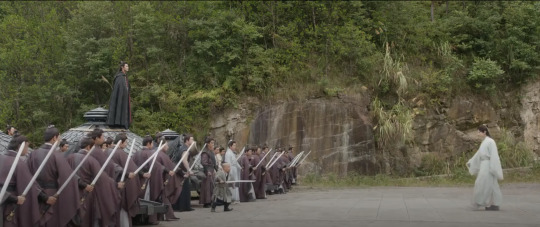
The scene is badass and triumphant... but it's also, on rewatch, devastating and tragic -- because it marks the moment where Li Lianhua seemingly becomes fatalistically trapped by the narrative he's been so desperately trying to escape. (And that's why I love love LOVE @redemption-revenge's post about Li Lianhua finally escaping the narrative at the end! Importantly in a "bonus" episode, which is... not a "literal" part of the show itself. ;)) Since Shan Gudao is performing as a paragon of villainy, Li Lianhua / Li Xiangyi must rise to meet him. (Yin and yang, in a sense.) And that's why Li Lianhua becomes so fixated on vanquishing Shan Gudao for the remainder of the show, though it feels quite out of character for him -- it's so like a prototypical hero. Shan Gudao's performance of villainy necessitates Li Lianhua's equal and opposite performance of heroism.
Which is so interesting and juicy!!!! because of Li Lianhua's series-long internal struggle trying to escape the hero narrative so many characters try to fit him into. (As @redemption-revenge also talked about here -- clearly we're brainrotting on the same wavelength lol.) In a weird way, I feel like the overall lack of nuance in Shan Gudao's performance of villainy actually allows for even more shades of grey in Li Lianhua's character. Not only does he have to reckon with in-world conflicts and consequences, but he's sort of engaging with the meta-narrative as well: can he escape the narrative that the other characters around him and also the show itself is trying to thrust upon him?
As a potentially controversial aside, this is why I actually loved the Nanyin royal blood reveal. It's so dumb and cheesy and predictable and part of the traditional hero narrative (maybe I'm looking at this through a very American "rags-to-riches" narrative lens, but bear with me here) -- but that's the point, according to the meta-narrative. Our reaction as viewers is also Li Lianhua's reaction. For Li Lianhua, this is the exact opposite of a gratifying, triumphant, and redemptive moment. I haven't gotten up to this in my rewatch yet, so I don't have have specific visuals in mind, but I do remember even from my first viewing the look of utter devastation and resignation of Li Lianhua's face in this scene. It marks the final nail in the coffin of Li Lianhua trying to escape the narrative. Like in epsiode 33 when his identity is finally revealed, Li Lianhua once again resigns himself to following the script of the traditional narrative, which is how/why he ends up heroically sacrificing himself for Fang Duobing and his family.
But anyway, back to Shan Gudao as an effective foil: In addition to serving a purpose for the meta-narrative, I also think Shan Gudao's one-dimensionality also works well with Li Lianhua's internal conflict regarding his feelings of guilt and self-blame. You're right, OP: I wish there was a bit more actual blame to lay on LXY -- though I think we can still blame him for being arrogant (to borrow the loaded iqiyi subtitle term) since he was clearly blind to his shixiong's real feelings, and blind to the feelings of those around him as well (including Qiao Wanmian). Though even if you take the track of Li Xiangyi truly never did anything wrong in his life ever (*heart emoji*), this makes his arc even more tragic. This is why I love him so freakin' much -- he feels less like a character and more like a real flesh-and-blood person. And the reason he feels so real is because he acts in ways that are often contradictory and self-sabotaging and illogical, because he's decidedly not following the traditional (heteronormative hero narrative) script. Even when there is a Grade-A villain right there in front of him to take all of the blame, Li Lianhua doesn't take the bait. He has a prime opportunity to look at Shan Gudao and come to the logical conclusion that he (LXY/LLH) actually did nothing wrong, that he's not to blame for any of the terrible things that have happened to him and to others in his name... but he doesn't take the out. He still refuses to forgive himself, he still internalizes all of the guilt, he is not suddenly "cured" from his trauma. He is so real for that, and it's gut-wrenching.
#thank you op I loved this question it got my brain a'churning#mysterious lotus casebook#li lianhua#li xiangyi#shan gudao#mlc meta#meta-narratives#storytelling
85 notes
·
View notes
Text
I hope that by now, after Hobi’s collaboration with J. Cole, Joon’s El Pais interview, and now Jimin’s Set Me Free Pt. 2, it’s obvious a lot of the criticism around BTS, much of what counts for ‘discourse’, is completely pointless.
Something I noticed after BTS released Fake Love in 2018, is that ‘Discourse’ around the mediums they choose to make music, the kind of music they put out, and how they communicate their ideas, all frankly just boils down to people dissatisfied that BTS didn’t express an idea the exact way those people would prefer, at exactly the time they’d prefer it. That’s it. It’s not a criticism that tackles the substance of their ideas or elevates the conversation around BTS, but one about personal preferences that people with inflated egos courtesy of the internet, mistake to be synonymous with meaningful appraisals of their skill, competency, and their characters.
BTS has always made music in a variety of styles and they’ve shown they’re more than capable of making some of the best hard-hitting and unconventional music there is, not just in Korea, but globally. But then they release a handful of pop tunes that while not my favourite, generated a whole multitude of k-pop stans circle-jerking to ‘discourse’ about how ‘BTS has lost their roots’ when all those people are actually saying is that “BTS didn’t make the exact sort of music I prefer or say something exactly the way I prefer, this time around, on my schedule.”
Take for example discourse around Joon’s latest interview:
Joon has shown similar candour as in the El Pais interview, in their 2022 Weverse interview, in their 2021 Billboard interview, and in honestly more Vlives and interviews than I can count. The primary difference between the El Pais interview and the others is in the sort of questions asked by interviewer/publication. That is what was refreshing because Western media outlets often do not take their music seriously enough to not venture beyond the obligatory ‘dark side of k-pop’ asks before grilling BTS on their potential romantic partners. The interviewer in El Pais was notably more informed about BTS and Namjoon in particular, and that carried through in the interview. Joon is older, more mature, and more comfortable (especially now that they’ve announced their intentions to enlist), but if you were paying attention, you’d realize he’s said a lot of what he said in that interview, long before. He’s not significantly more eloquent and more candid than he was a year ago, he simply responded to the interviewer based on the questions posed and the tone used.
Another example is in Jimin’s latest release, SMF Pt 2, which brought to mind criticism of Jimin I’ve seen from solos, multis, antis and general k-pop stans every fortnight or so, for the last eight years. We can all see references in the lyrics, in the choreography, in the stylistic musical choices, in the medium: rap vs vocals, to many BTS songs and even Jimin’s solo work put out long before. In SMF Pt 2:
For lyrics and message, Jimin references narratives expressed in Lie, Promise, ON, among others;
For sonic expression, Jimin references Friends and ON, seen in his preference for choral effects; Tony Montana and Black Swan for autotune as a tool and rap music as a medium;
For dance/choreography, Jimin references Butterfly, Lie, and ON.
Set Me Free Pt 2 is a combination of various expressions we’ve already seen Jimin do, sharpened to the extreme to drive home the point that this is his time and everyone should get the fuck out of his way.
It’s effective.
Like JITB and Indigo before now, I’m already seeing people lament that Jimin is talking about how their fame affects him, the reference to his haters, or that he is too proud and egotistical. And some Anons are already starting to fret about it in my inbox. I don’t know what to tell y’all besides that I don’t care. I’m not sure how many times I can show that none of those people know what they’re talking about. I’m not confident enough to express how little I think about some random’s opinion about music and how I listen to it, without rudely telling them off in two syllables.
All I’ve got to say about the discourse around this song is ‘fuck off.’
I’m enjoying myself too much. I’m loving Jimin’s vocals and self expression too much. I’m too happy to give a flying fuck what anyone else thinks on the matter.
Aside, Jimin has inspired some of the best fanart I’ve seen in ages:
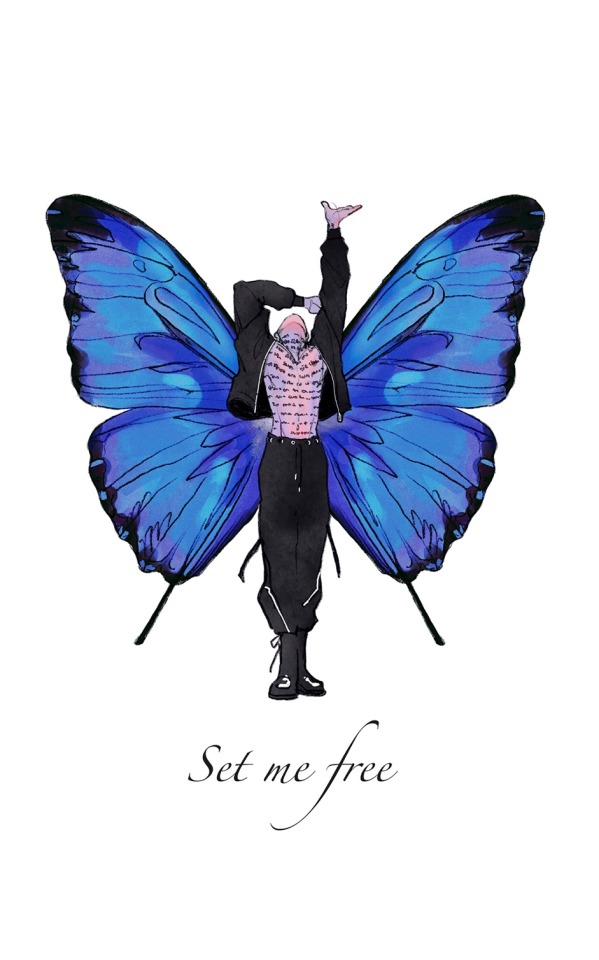
Credit: @/5813_99
*
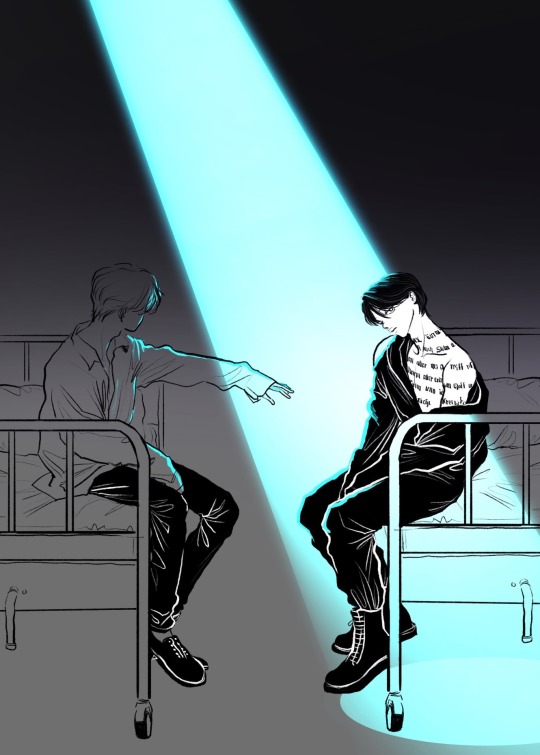
Credit: @/5duelle
*

Credit: @/0901mg_
*

Credit: @/glassrtz
*

Credit: @/emmysuga
156 notes
·
View notes
Note
Is there a fanfic wbere Enji actually is a father to Shouto? Because I will be honest. I don't think he liked the kid very much or he wasn't the one he bonded with the most. I just like to see that for once..
Well...
...let's start with canon first as this might be an interest shared by more people.
The usual premise is that I'm not Horikoshi so I don't own The Truth. What follows are my beliefs. Feel free to disagree.
Did Enji like Shouto in the manga? Did he bond with him?
When Horikoshi created the Todoroki family very likely he had in mind some typical TRADITIONAL Japanese tropes and values for it, tropes and values which aren't shared in the west (and, to be honest, are dying down in Japan as well, but it's a 'recent' thing).
For example we see Enji as 'not being a father for his kids'... but in old Japanese manga and anime his behaviour toward Shouto would have been, shockingly (or maybe I should say 'disgustingly'), considered the behaviour of a very loving dad.
I've discussed more about it here, and I should probably make a meta about it since it seems a topic of relevance, but in a not so far past, in manga and anime and other media (and also in real life) if your father were to take his time to train you in an abusive way, it was considered the peack of fatherhood because he was helping you to improve, because it was believed that harsh training (read: abuse) would help you to improve, and if you were against it, you were only an immature brat, but eventually you would realize your father's love and the story would have a touching scene with the kid crying and being grateful to his father for the training (read: abuse) he received as it actually was a splending bonding moment (yeah, it was a disgusting mindsetting).
As if the abuse wasn't enough, back then it was believed being what we would call a 'loving dad' western style would make your kid weak, so a model father should be stern and criticize and not praise him.
Horikoshi mostly subverts this trope as Enji will never get praised for his way to interact with Shouto but will be forced to understand that his behaviour was wrong and that a real father would have acted differently.
Still, in this setting, Enji did love his kids but acted following outdated (and extremely harmful) educative methods that caused more harm that good to his children especially to the one he tried to bond with the most, Shouto (because bonding through abuse is actually not going to work).
Of course this comes in with huge narrative problems especially for western readers.
In many western countries we're very aware of how such behavior is so deeply wrong we just can't see it as misguided love. We believe Enji SHOULD KNOW his behaviour toward his kids is wrong, that it's abuse, and that a person who loves his kids would never abuse them.
To make matters even more confusing Horikoshi retconned the Todoroki family more than once, which makes even harder to follow its dynamics.
As a result, if we look at Enji, we don't see a father who loved his kids but acted in the wrong way with them due to wrong educative beliefs, we see a person who didn't care about them beyond for the use they could have for him, and didn't bond with them at all. In fanfics this often gets portrayed in an even stronger manner than canon, with Enji being much more of an abuser than he is in canon, beating his kids horribly.
So is there a fanfic in which Enji actually is a father to Shouto?
I don't really have knowledge of all the fanfics in the net (and I generally focus on fanfics that regrd the Todoroki family as a whole) but I can reassure you saying I'm aware there are some. If you go to AO3 you might want to look at the tag Good Parent Todoroki Enji | Endeavor or at the tag Todoroki Enji | Endeavor Redemption.
Of course, since Shouto is the forth of four kids, in fanfics that decide that Enji is going to be a good father from the start, his behavior generally changes BEFORE Shouto is born.
One of my fave fics "Where your love has always been enough (for me)" by @classicequinox depicts Enji as being a loving dad to Shouto... but the Shouto of the story never gets to experience him being a bad dad. Enji has already changed his ways way before Shouto's birth and you see him interacting with Shouto after a good number of chapters because... the story has to reach Shouto's birth.
The same goes with "as i live and breathe" by extrastellar which actually focuses on how the premature birth of Touya, and the fact he might not have survived, pushed Enji to change his life. So he's a good father to Shouto but... you don't see much of it because the story focuses more on what pushed him to change.
Other fics I know have Enji have a change of heart later on (either due to Touya resulting alive, Enji travelling back in the past but reaching a point in which Shouto was already born), but it's generally a change of heart that involves all his family and not just specifically Shouto.
Still you can try adding to your research the tag Todoroki Enji | Endeavor & Todoroki Shouto and see if the combination of this tag with the other two give you fics that focus specifically on Enji and Shouto's relationship instead than on all the Todoroki siblings.
Something else worth mentioning is that, although I saw many fics giving Enji a change of heart due to Touya, in canon it's due to Shouto (and Midoriya) Enji slowly starts having a change of heart.
Midoriya pointing out Shouto isn't Enji impressed Enji...
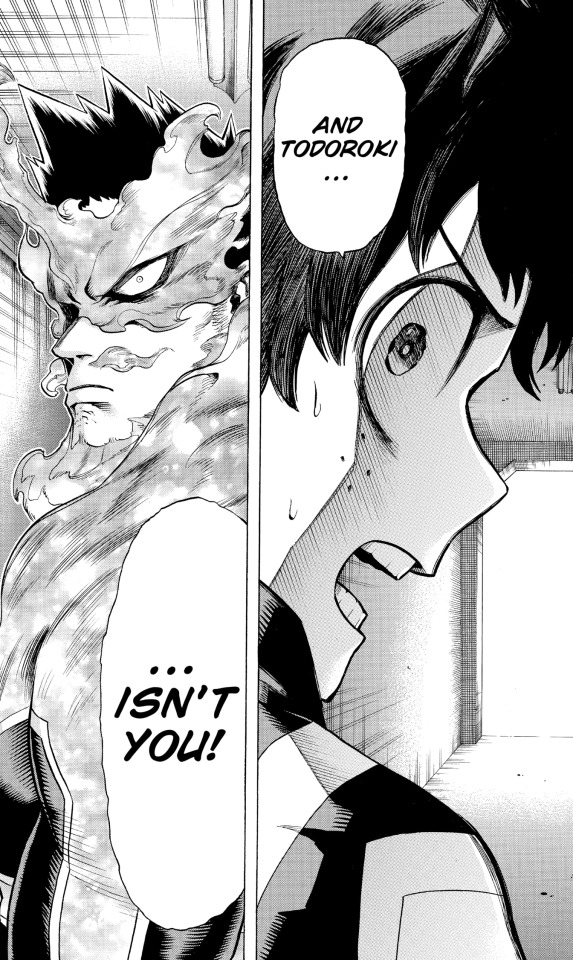
...when Midoriya will intern under him Enji will still remember his words.
Then we've Shouto rejecting him after his fight with Midoriya. Enji, in a way that's faithful to the old trope of the (abusive) trainer/father, expected now that Shouto had used his fire as he wanted, had grown over what he believed was a childish rebellion. Shouto instead makes clear he's not over it, that actually he used his fire because he has forgotten about him (in the old trope it would be the opposite, Shouto would have used his fire because he had finally embraced Enji's teaching... instead Horikoshi completely subverted it)
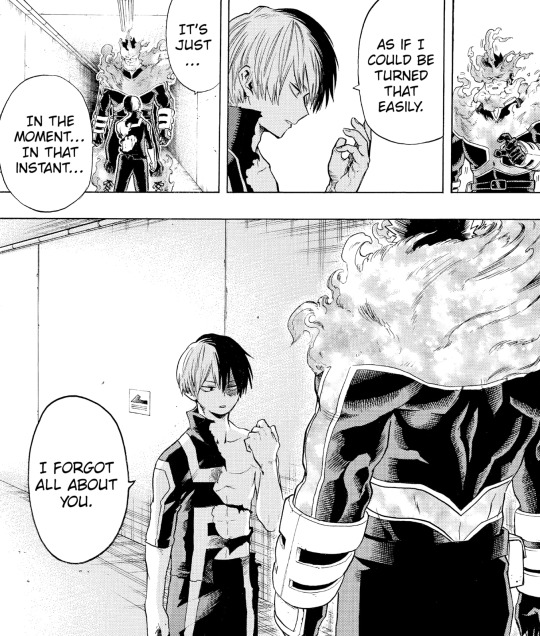
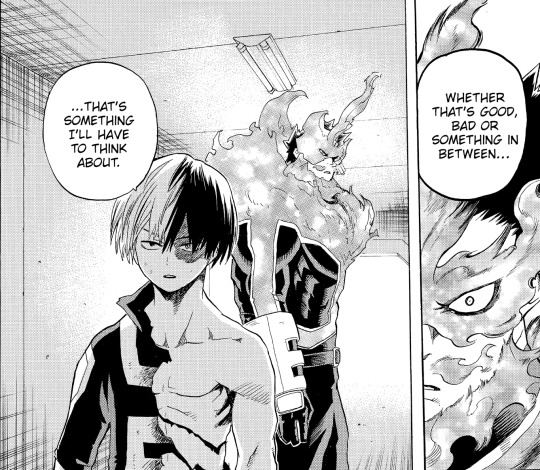
Enji is forced to realize he's not the role model he believes to be for Shouto. Shouto actually shows his best when he doesn't follow his father's teaching.
This, combined with the fact that when All Might task him what purpose his strength serve and Enji connects it to safeguard his son's future...

...is what will later push him to try to connect with Shouto, praising him and telling him he'll try to be a Hero he could be proud of.
And it's always Shouto (though this time probably combined with Natsuo)...

... who later pushes him to think what he could do for his family each night.
I could go on but still canonically Shouto is a big part of what lead Enji to change... but the change is so slow it's easy to miss it (I've talked about Enji's atonement arc in two posts which are available here and here) and since the atonement arc hasn't ended yet, we hardly see Enji being good to Shouto in a way that can feel consistent and satisfying for the expectations of western readers... to us he just does too little (which is why many fanfic authors prefer to focus on something drastic happening that pushes him to make a 180° turn instead than slow tiny little hardly visible improvements)... but well, we aren't the intended audience and we lose nuances that instead are important for the intended audience.
Said so I fully understand your wish for an Enji who finally acts like a good father to Shouto as poor Shouto definitely deserves more love and I hope you'll manage to find many fanfics that will focus on them and provide it to you.
Thank you for your ask and for the chance to talk a bit about Shouto!
10 notes
·
View notes
Text
Poor Things (2023) review
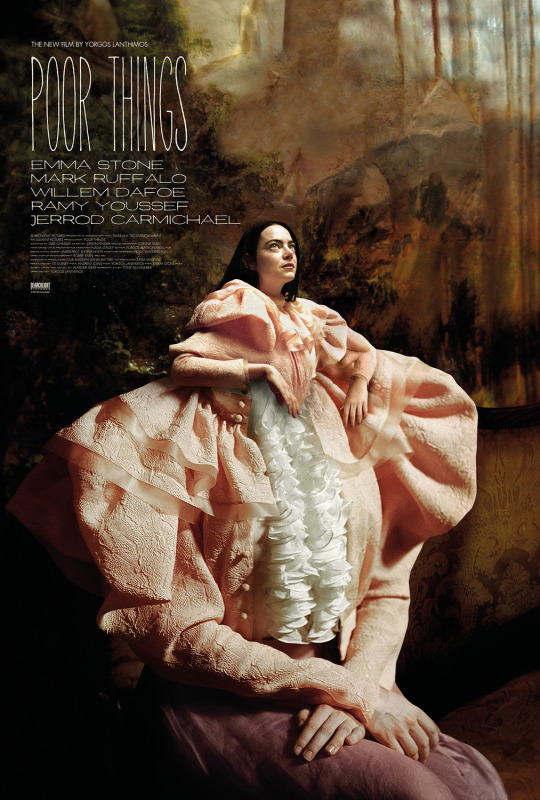
Yorgos Lanthimos may be the new Quentin Tarantino when it comes to feet fetishes in cinema, as there are so many Emma Stone feet shots in this movie… so many. Also, her little toe is oddly square shaped, just saying.
Plot: An incredible tale and fantastical evolution of Bella Baxter (Emma Stone), a young woman brought back to life by the brilliant and unorthodox scientist Dr. Godwin Baxter (Willem Dafoe). Under Baxter's protection, Bella is eager to learn. Hungry for the worldliness she is lacking, Bella runs off with Duncan Wedderburn (Mark Ruffalo), a slick and debauched lawyer, on a whirlwind adventure across the continents. Free from the prejudices of her times, Bella grows steadfast in her purpose to stand for equality and liberation.
At first I was very much a fan of director Yorgos Lanthimos’ directing style, with him managing to take any event or piece of dialogue and turn it into deadpan awkwardness. As such, his indie films The Lobster and The Killing of a Sacred Deer both are great examples of entertaining postmodern cinema with each one featuring a dystopian visual style. That being said, his last film The Favourite, even though it was a hit with the critics and the award ceremonies, for me did not hit the same. It felt much more reserved compared to the director’s previous efforts, and his usual weird style just came off crude and the humour for me personally did not land. Nicholas Hoult was a hoot though, but when isn’t he! Anyway, going into Poor Things I was hoping for more of the original magic which I’ve seen from Lanthimos in his earlier works, and the trailers with their vibrant visuals really sparked my interest, so I went in with high hopes.
So in terms of the visuals, Poor Things may just feature some of the best and most imaginative sets of any movie of 2023. Starting off the first part in black-and-white, very reminiscent of the old Universal monster flicks, but then 30 minutes in transforming into a technicolour dream world with colours popping Wizard of Oz-style, with every shot reminiscent of a vivid painting, with the use of the fisheye lends to create a somewhat watercolour effect to the backgrounds. The movie looks and feels artificial, which connected well with the narrative of this Frankenstein’s monster type woman learning and discovering everything with a brain that’s both her’s and not. Oh, and she happens to also wear rainbow glasses, so I can only imagine how much more stranger the world must look through her eyes.
The film’s biggest asset is its acting. Emma Stone is phenomenal as she has to play a grown woman with the brain of a baby, and then show us that woman growing into her brain (or maybe show us the baby growing into the woman?) over the course of the film. She really does throw herself into the role and it’s the type of role that awards shows will delightfully seek their teeth into. Willem Dafoe as the maker of Bella felt like a character that walked straight off a David Lynch fantasy, from the prosthetic make-up to his performance as the mad scientist that falls for his creation. But the real stand out here is Mark Ruffalo who simply is on another level. Playing the slimy player who only sees women through the male gaze, and attempts to take advantage of Bella’s naive outlook life for his own physical pleasure, it’s the kind of character you are supposed to despise, but gosh did I love everything Ruffalo was doing in this film. He was truly hilarious with every piece of his line delivery successfully painting the pathetic nature of his foolish character. Most critics will be showering Emma Stone with praise and deservingly so, however I believe Mark Ruffalo should not be overlooked and may be the actual MVP of the whole movie.
Narrative wise this is a fun feminist spin on the Frankenstein formula, that is a loud and proud shout to female autonomy for those who may have found Barbie a bit too cheesy and perky, yet I do find the movie to be overly cynical against its own good. It's like Lanthimos approached the film in the same way the mad scientist played by Willem Dafoe in the movie approaches his medical experiments -- with a cool eye and a lot of curiosity, but very little heart. And for the bubbly and big eyed Bella that is full of life and excitement, the film she’s in is the polar opposite. Look, I admired the film for what it was, but the romantic within me wanted a bit more of the, as the French would say, ‘amour’. Also there was just too much sex for my viewing pleasure. Again, I don’t mind a lil’ hanky-panky in my films, but when I’m sat in a dark theatre surrounded by many perverts with 90% of what I’m watching being humans doing the thrusting and the throbbing, it is a tad uncomfortable. You can also imagine what my fiancée thought when I told her afterward about the movie’s heavily erotic side.
Poor Things is very much a film that screams the director’s unique and distinct style and I truly respect it for that, however I personally feel like its not my cup of tea as it was a bit too cold for my liking. There wasn’t really a character I could connect or sympathise with, and even though Mark Ruffalo is funny as hell, his character is a piece of scum and a half. Again, kudos to the whole production team and cast for a great niche slice of art house cinema, but it’s too creepy for my liking.
Overall score: 7/10
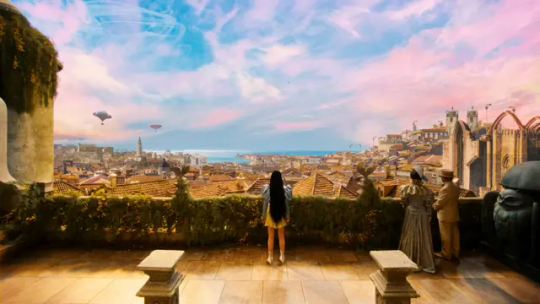
#poor things#movie#film#movie reviews#film reviews#comedy#drama#yorgos lanthimos#bella baxter#emma stone#mark ruffalo#cinema#willem dafoe#steampunk#dystopia#poor things review#2023#2023 in film#2023 in films#2023 films#fantasy#frankenstein#searchlight pictures#ramy youssef#margaret qualley#christopher abbott
14 notes
·
View notes
Text
Nintendo-vember Level 4 (Part 2): Because this one had way too many pictures to make a point...
Continuation of the following post
Okay, so in addition to Dobson's own Link not really looking very familiar to the actual Nnintendo designs, I also decided to do the following. Getting a bit into hair sperging, I pulled out this little chart for hair color.
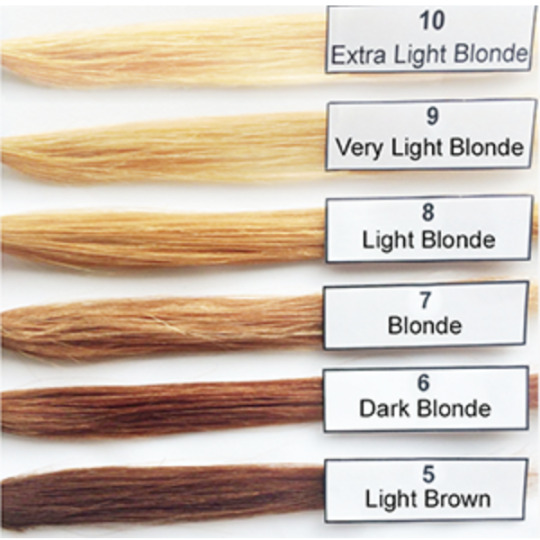
Now, to compare it with the Link designs predominant before OoT came out.
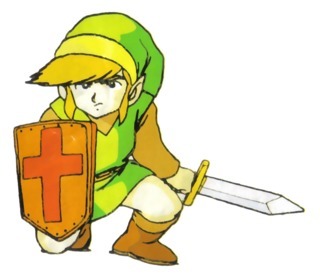

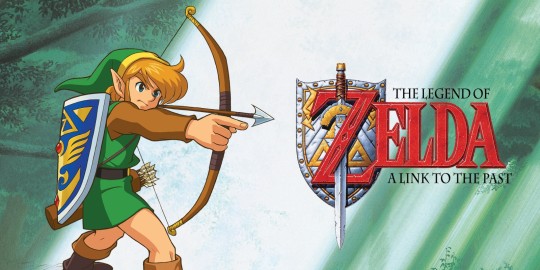

So we got Link from the first Zelda being somewhere between light blond and blond, Zelda 2 Link being dark blond and SNES and Gameboy era Link (who are the same and as such the favorite incarnation of Link gamewise according to Dobson) at Light Blond.
Where could dark brown haired Link come from?
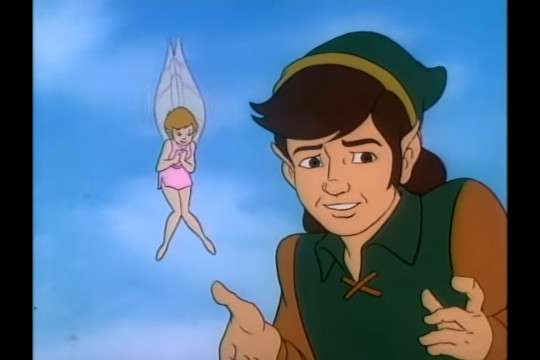
Oh, right! The Douchebag of Time.
It is just weird to me, that the hair color is something Dobson has taken such a grief with when it comes to Link. Cause in all honesty, I am not certain how such a minor design detail can affect ones enjoyment of the Zelda games that much. Anyway, to the last point
?????
Yeah okay, I admit I am not quite certain what the last panel is even supposed to be about. I think Dobson wants to criticize the fact that now multiple Links exist, instead of the Legend of Zelda series being kinda like Mario. You know, one character all the time fighting the same villain over and over, instead of there being different incarnation of the character (and others such as Zelda and Ganondorf). I should admit, that aside of the OoT/Majora’s Mask Link, I kinda assumed actually till the release of Four Swords/Wind Waker, that the Game Boy and the SNES games followed only one Link. Which even nowadays in the branched timeline continuity they still do
Which btw proves my point from earlier, that it was only post OoT the execs kinda screwed the timeline up in such a manner, we would need the TVA to fix it. Anyway, till Four Swords came out, I thought Link was really just going to be the same hero in all games, just with a different design each depending on whatever console’s technical abilities. Then the multiple incarnatins and timeline thing became the norm and… well, I don’t get what is bad about multiple Links or making it that the games are kinda their own thing/continuity in a certain manner.
For example, I can still play Wind Waker also as something of a solo game if I take the backstory of how Hyrule ended up under the sea just as a backstory on its own, instead of thinking about its context in a bigger narrative. Plus it allows programmers and people in the story development department to kinda go crazy/creative with designs for characters and locations, because they aren’t “bond” to capture the style of a previous game to the point that even slight variations would feel out of place. Like imagine doing Breath of the Wild style Ritos in Wind Waker or adapting the 2D Zelda environment of A Link to the Past without much variety into 3D. Plus I think that if we only followed one Link time and time again, his adventures would pretty much become less special over time, because him fighting Ganon then becomes more of an average Tuesday chore.
So…That was Dobson’s comic venting about what he hates about OoT. And I have to say, a lot of these complains (as I tried to explain here) are arbitrary as hell to me. Dobson essentially complaind about aesthetical choices the game made, that all things considered were kinda necessary for this franchise to make the jump not only into the 3D era of gaming, but also in the storydriven era of gaming itself.
See, I like the Zelda series, but as a fantasy series up to this point, I wouldn’t really call it the most “challenging” game storywise. Defeat an evil pig demon, save the princess, explore dungeons. That was it and kinda is still the base line appeal of those games. But even just compared to some stories we got by comparison for example on the SNES (Breath of the Wild 2, Chrono Trigger, Final Fantasy 6) Zelda was not really that deep. This game may not have even been the first Zelda game with a bit more “depth” to it (Link’s Awakening was that for me with the island being revealed to cease exisisting once the Widfish awoke), but it certainly was one that fleshed the world of Hyrule out a lot and in doing so introduced multiple technical, story relevant and aesthetical aspects to the franchise, that went beyond what A Link to the Past already had done in 1991. And that game in my opinion, while great, mostly just improved on the aesthetical aspects by assuring the game looked better in 16-bits than anything on the 8-bit NES.
To be fair though, I may also just be a bit biased here, because Ocarina of Time was an important game in my childhood I have very fond memories of. Both in context of the game, but also outside of it. But considering I am not the only one who likes it, I think it is safe to say that it is a good game. Is it the best Zelda game ever? Well, we have Breath of the Wild/Tears of the Kingdom now, so likely no. But it is certainly within the top four Zelda games and will likely stay there even the next few decades. And acting like it is total shit and its fans are “lesser” being for enjoying it, is not just contrarian, it is outright insulting. So in that regard: Fuck you Andy. May Octorocks ejaculate upon you, while the rest of the world finds enjoyment in that game.
And on that note... Happy anniversary to the Ocarina of Time. The best wishes from me for Impa, Ruto, Darunia, the Twinorvas, Ganondorf, Epona, Sheik, Zelda, Link, Navi, Sarina and all the other characters and the people behind Ocarina of Time for giving us one of the best games on the N64 and within one of the most beloved Nintendo game series ever.
May your melody be heard for 25 more years at least.
youtube
#so you are a cartoonist#andrew dobson#syac#adobsonartwork#webcomic#tom preston#adobsonsartwork#so you are andrew dobson#legend of zelda#ocarina of time#link#nintendo vember#nintendo#Youtube
17 notes
·
View notes
Text
So I finished the Ada campaign, which means I've now actually played all the campaigns of Resident Evil 6 between the original release in 2012 and now. It's been quite a while since I've played the other campaigns, though. My feelings toward this game are still mixed, which probably isn't surprising, but it's hard to give a full recommendation or caution for this game. What you want to get out of this game will impact whether you like it or not. There are a few things that I can criticize absolutely, though.
Okay, so this game in whole is absurdly long for a RE game. The longer games in the series historically were RE4 and RE5, which can feel a bit lengthy on the first playthrough but are single campaigns broken into very digestible chunks. RE6 campaigns tend to feel just a little longer than they should given the material they are working with. That's to say nothing of their much poorer pacing at times. Ada's campaign actually ends up mostly fine, and it's also shorter than the others in terms of playtime. Thing is, the game is also often very action focused, pushing you to move quickly and fight rather than run due to the often enclosed spaces, which I find tiring for long play sessions. Between the thin hallways of a submarine to the surprisingly restrictive construction of an abandoned street market, RE6 is less interested in offering you ways to run than ways to fight. This is, to me, often fun and a good time, but the tension it creates isn't really right for the horror that RE tends to invoke. It's less George Romero's Dawn of the Dead and more Zack Snyder's Dawn of the Dead, and I'm far more of a Romero fan at the end of the day.
Speaking of differences in storytelling, RE6 does another thing that I find to be particularly troublesome. See, Resident Evil has always been a story of conspiracies, corporate malfeasance, government corruption, and how the best any of the so called "good cops" can ever manage to do is get a few people out of a bad situation without being able to actually change anything. Something RE has usually avoided is excessive sexualization. There are exceptions, most notably character designs like Alexia Ashford's first boss form and alternate costumes, with special mention going to Sheva Alomar's Tribal costume from RE5 being another example of that game being genuinely quite racist as well. Sadly, RE6 has nearly enough moments that are fairly sexist to nearly equal the rest of the series before it put together. Ada and her doppelganger Carla are shown naked twice (no details, of course), Sherry is the only returning character who isn't the title character in her campaign, and then there's Deborah, a boss fought in both Leon's and Ada's Campaigns who is a naked woman writhing like an exotic dancer while attacking you with giant tentacles. There are other moments, but Deborah is enough by herself to justifiably put people off from the game. As an aside, the entire game's conflict is the result of one very powerful man having a certified incel moment and forcibly transforming a woman to look like Ada Wong because he has a sexual obsession with her. It's pretty bad in general. Chris, Piers, Jake, and Sherry fair far better narratively IMO by being mostly unconnected to that crap, but it's still overall a low quality story.
Mechanically, the game is mostly fun. Like I said, Zack Snyder Dawn of the Dead, even having a moment where you have to defend a bus full of survivors from zombies. Every character has a slightly different style based on their unique weapons and melee skills, and it makes everyone fun to play for someone once you get the hang of the controls. The Combat bar (your stamina meter) is the central focus of moment to moment combat, minimizing ammo consumption and allowing for many fun combat opportunities. Ada, for instance, can quickfire her crossbow to either immediately stick a bomb to a target while reloading the weapon in one move, or can use a regular arrow to stick an enemy to the ground or wall for an easy finisher. Leon's handgun has two modes, one for staggering for melee followups, and one that lets you pour bullets into an enemy to maximize damage. Combined with the skill system that lets you unlock, purchase, and equip bonuses to fit your playstyle, the game is able to be tuned to your liking. The controls take time to get used to, and the quick time events are overused to the point where turning them off in the options menu is quite tempting, but there's a lot here to like in terms of pure play.
Resident Evil 6 didn't get a fair consideration when it was released, but it didn't really ask for one either with the name and legacy of Resident Evil attached. RE6 is an action focused thrill ride that outclassed the Paul W.S. Andersen Resident Evil movies in how much action and fanservice they could cram into the product without seeming to get the core of why people loved Resident Evil for over a decade prior. Capcom didn't let RE6's fairly impressive sales numbers prevent them from course correcting, though. They thankfully went on to give us the fantastic Winters storyline of RE7 and RE8 while dialing back the adrenaline for the more action oriented Revelations 2 and later REmakes. Resident Evil 6 therefore remains a very fascinating game from a unique time in the franchise's soon to be 30 year history, and is unlikely to ever be revisited outside of ports for modern consoles. It's a historical piece, and for people who are interested in the shifting nature of game design over the years, it's definitely worth checking out. I'd recommend waiting for a sale, though. XP
4 notes
·
View notes
Note
Thoughts on NrX? Do you agree that they basically reverse enginered marxism, but are too emberasssed to admit it do to their surface level dislike and signaling to anti-comunists?
NRx is Marxist in narrative structure but with a different protagonist: the owner rather than the worker. But since the actual protagonist of Marxism turns out to be the intellectual-bureaucrat rather than the worker, I don't see as big of an ethical difference as you might expect. NRx, too, might end up having a secret protagonist. I should quote the peroration of Reality Spammer's essay cited in my last response:
Nick Land at this point must certainly have earned the title of the most important philosopher of the past half-century. Everyone now is thinking in relation to accelerationism. In the context of the growth of acceleration, neoreaction, the dissident right, is Elon like the Stalin to Nick Land’s Marx? Elon of course almost certainly does not know who Land is. But they share the same triad of objects of zeal — a sense that the industrial process must intensify in an uninterrupted way, racism, and a joy in spreading irreverence as far as possible. Racism, this all-too-human passion as old as man, becomes the weapon to dismantle the human plane, by accelerating its internal differences until it breaks. The emergence of this pure demonic theater of simulacra where the formality of a public sphere once lingered is its shattering into entropic fragments as it splits apart, a spiral into radio static and catatonic schizophrenia.
On this account, NRx uses race the way Marxism uses class: to start "a war inside society" (per Boris Groys) that they hope to win. I'm not entirely sure this is how it's going to work, though, even as NRx seems more and more poised to get its way with the rise of a figure like Milei and the potential or even likely return of Trump amid the atmosphere of Elon's X. Is the left really so terminally depressed, so self-immolationist, that it now understands "irreverence" and "racism" as inextricably synonymous? Did Bakhtin laugh in vain?
The peroration of Land's own epochal "Dark Enlightenment" manifesto derives its indeed right-Marxist vision of our immanent self-transcendence via self-conscious speciation from a series of novels by Octavia Butler that I admittedly haven't read. (I browsed through them. I like Butler—Kindred and "Bloodchild" in particular, and I did find those two texts sort of reactionary—but the Xenogenesis books Land cites seemed a little pulpier than I wanted to deal with. I suspect such subject matter might require a prose style akin to Bradbury's, Delany's, or Ballard's, more visionary and iridescent. Dick and Herbert, whom I also admire among science fictionists, have the same plain-prose problem.)[*]
Is the famously racist NRx then an Afrofuturism, given that I claimed 10 years ago that it was also a queer theory? (Consider also the gender accelerationist blackpaper, which renders NRx a trans theory.) Why assume that dismantling the "human plane" must lead by logic to racism? Maybe it will lead to the disarticulation of race, as surely as it's led to the disarticulation of gender. (When I was in grad school, everybody blamed humanism for creating racism!)
This isn't an endorsement of NRx, and I don't dispute the personal racism of some of the people involved, but I'm not persuaded by the equation between tech accelerationism and white supremacism. There's as much reason to think it could go the other way. Here the specifically racist libertarians mirror the Afropessimists as well as the Marxists. But it's not necessarily how the resolutely optimistic Frederick Douglass, for example, would have thought about it when he saw technological development as part and parcel of individual equality: the camera disclosing the soul in every skin.
(I know my critics think I am too cavalier on the subject of race. I just think it's going to disappear. I don't think it stands a chance. Reality Spammer says, "There is a sense in which 'everyone is racist' is simply an analytic a priori." And there's a sense in which it's not. NRx's biological racism won't work, not only because race is a construct, but because biology is too. Science waits upon art and magic; leave Steve Sailer to his golf course. From Melville's repeated image of the oceangoing vessel as Anacharsis Cloots delegation of universal humanity to Morrison's concluding vision of the Black Madonna onshore awaiting such ships of holy fools to dock in Paradise, this is an American prophecy.)
Reality Spammer is right, I suppose, about the vulgarity of Ye, Elon, etc., but, leaving aside the eloquence of the vulgar (as if "beautiful big titty butt-naked women" played no role at the root of the human imagination), there is a world elsewhere, even in right-wing world. The queer-femme wing of the new right is reading Gone with the Wind, sure—I've never read it myself—but they're also promoting Pamela, the first novel to sentimentalize, aestheticize, and universalize bourgeois hegemony, and so the secular type and pattern of all future individual liberation narratives, not excluding Douglass's. This is something like what I had in mind 10 years ago when I said we'd know if there was anything to neoreaction if it went from black to pink, aesthetically speaking, from Gothic to sentimental, from Lovecraft to Joyce. Another recent favorite of this group, Poor Things, a socialist novel written by a Scottish nationalist, was converted for the atopic-utopic purposes of global cinema into a post-woke porno-libertarian fable. It ends in the multiracial queer paradise of a walled garden, secured in part with the earnings of sex work to refuel the professionalization of a new cadre of techno-experts symbolized by Bella's journey from one type of working girl to another.
The "human" is not a self-evident category, even if I'd prefer to travel under its banner myself. The neoreactionaries, like their soixante-huitard precursors, were only anti-humanists insofar as the human was a Hegelian synonym for the state (and antonym therefore both of the individual and of empire, a word Blake, Shelley, and Whitman used without negative connotation to signify a post-national world-polity). What the human might become in an age of accelerated techno-capital is unclear—if such acceleration even works; if we don't regress all the way back to the forest, the desert, and the cave in the conflagration of the rules-based international order, victims at last of Enlightenment's dialectic—but why should we forfeit our species's name at the very hour of the potential triumph of our species-being as the aesthetic angel-animal who is both subject and object of its own thought? As the first review of my latest novel tells us, "the 21st century isn’t likely to become any less weird."
"There are no sides," the defeated white witch admonishes her successor of imperial realpolitik at the end of Dune Part Two. (How's that for a reversal of the moralistic speech concluding The Two Towers? Herbert's Cold War realism portends no less of a Republican victory than did the reanimation of Tolkien's World War II moralism two decades ago, but how different are today's Republicans?) I am personally ready for anything. Or at least I'm trying to put on a brave face. I have read Arendt and Adorno, not to mention Ruskin and Thoreau, and have every single fear about these developments everybody else does. Still, NRx might turn out to be a humanism after all, and therefore neither especially new nor meaningfully reactionary.
We see, now, events forced on which seem to retard or retrograde the civility of ages. But the world-spirit is a good swimmer, and storms and waves cannot drown him. He snaps his finger at laws: and so, throughout history, heaven seems to affect low and poor means. Through the years and the centuries, through evil agents, through toys and atoms, a great and beneficent tendency irresistibly streams.
____________________
[*] In Land's Compact articles on the English canon, he was so magnanimous as to promote Butler, alongside some nameless "Jews and Scots," into a DEI English "para-canon." Seeking to establish the paradox of a people-who-are-not-a-people, the maritime liberalism-imperialism of an "out-breeder culture," he identifies the central revolutionary dialectic within English literature, which can be described ethnically as Anglo vs. Norman, politically as left vs. right, religiously as Nonconformist vs. Anglo-Catholic, or aesthetically as Romantic vs. Classical, with the latter side relegated always to the role of ineffectual (indeed sabotaged) brake on history's runaway train. As I hinted in my most recent Invisible College lecture, you can use even Jane Austen to stage a global revolution. To this revolution are we "Jews and Scots" summoned, those of us who have spiritually interbred with this literature which was not the literature of our forefathers—my forefathers had no literature, you see, and so I had no choice—whether we are the Pole Conrad, the Dutch-American Melville, the African-American Butler, or the Italian-American Pistelli.
8 notes
·
View notes
Note
Oo what's the drama with Colin Falconer
I only ever read one book of his, but God was that more than enough. It was about Hürrem sultan... Well, mostly, there's this subplot about this chick named Giulia and guy named Abbas, anyway hon if you ever had trouble with low blood pressure, 10/10 would recommend, otherwise it's not a book for you, in fact I cannot imagine a book less for you if I made it up Goncharov-style. It's basically like Magnificent Century, if it was very much written by a western author and A BILLION TIMES WORSE
Have you ever thought Magnificent Century was a little unfair to Hürrem? In Harem, she's the most evil harlot to have ever been spat onto the face of the Earth by the hell itself. Seriously. Think of any redeeming quality she could have, quick. This Hürrem very pointedly and explicitly does not have it. Her love for Süleyman? Hah! She's been pretending this whole time to make Süleyman her slave! Love for her children? Nope nopity nope! This Hürrem actually lies to Süleyman at her deathbed that Bayezit may not be his son, just so he would kill him, because she wants Selim to take over. Not because she prefers Selim, but because she knows he would be a terrible sultan and destroy the empire she hates so much. Oh, so she's a broken, traumatized kidnapping victim lashing out against her oppressors? Well, I guess, but Falconer downplays this aspect of her character as much as possible, basically only mentioning her feeling "trapped" at the start of the book, just making her seem angry and not at all like she's, you know. Traumatized. So she at least has some empathy towards her fellow slaves? Or anyone else in the entire world??? No! This Hürrem is an absolute evil incarnate, like she does not do a single good thing for anyone else ever, even by accident.
Have you ever thought Magnificent Century didn't quite do the justice to Süleyman the Magnificent? In Harem, he's but a pawn in the hands of eeevil Hürrem, who catches every bait, is fooled by every trick and unwittingly helps her fulfill every evil plan of hers. To Falconer's miniscule credit, he does make an effort to kinda, sorta make reader see what Süleyman sees in Hürrem, and at times he's almost an interesting character, but one of the greatest statesmen of the Ottoman history he is not.
Have you ever thought Magnificent Century can be a little bleak? Well, In Harem, Colin Falconer has made it his life's mission to prove that he's the edgiest little edgelord, to only be beaten by Tara Gillespie. This book is an excellent example of wannabe gritty realism that ends up saying nothing about real world and not feeling real for a fucking second. Like, just focusing on the harem itself, the life there is presented as miserable, which, fine, we are trying to sympathize with these women... I would say if I didn't have a sneaking suspicion that Falconer lowkey hates, or at least does not particullarly care for the other gender. So what you end up with is an endless parade of suffering women that the narrative doesn't give any dignity, agency or empathy. The only exception is Giulia, whose life of repression and meagre attempts at reclaiming agency would be kinda interesting, if they went literally anywhere, but they don't, because Falconer kinda hates women, but readers even moreso. And don't get me started on the sexualization, because if Minette says you enjoy describing the titties too much you, you definitely enjoy describing the titties too much. Which together with the endless abuse of women just makes this book feel all the more gross.
Have you ever thought Magnificent Century has a problem with not being critical enough of the empire? Well, Harem tries that, but then Hürrem is presented as irredeemably evil for trying to ruin the empire and tricking Süleyman into fighting less, which she does not do out of political consideration, even though her arguments make sense and it's probably what IRL Süleyman realized on his own, also saint Mustafa is still there and still as much of a brave soldier destroyed by the evil Hürrem as ever... Basically any effort at critique is demolished as thoroughly as possible by the sheer force of author's hatred for Hürrem.
Have you ever thought Magnificent Century has unfortunately left out or underserved some interesting female personalities of the era, like Süleyman's granddaughters or the female buddies of Selim II.? In Harem, Ayşe Hafsa is... Well, there for a portion of the book, basically twiddling her thumbs, which is nice, because at least they can't ruin her. Mahidevran is yet another female victim without agency, just a bit more prominent than the others. Mihrimah is there for one scene, just to establish she hates her husband, have her exposited on by Rüstem and ABSOLUTELY NOTHING ELSE. Yeah. Like, fuck, this book almost makes me want to appologize to the Magnificent Century Mihrimah, she's a pretty unlikeable character, but at least she is a character. And Nurbanu? Nurbanu who? We don't know 'dem, and we certainly don't have 'dem over here!
Have you ever thought Magnificent Century was unfair to Selim II.? In Harem, he's a monstrous child rapist in addition to a drunken glutton. Also, no Nurbanu, because fuck you, reader, at this point of the book you really shouldn't have expected anything.
Have you ever thought Magnificent Century plays fast and loose with history? Harem can't even get the order of Hürrem's children right. Seriously. For example, Selim is the firstborn in this. Because why pass an opportunity to be pointlessly stupid?
Have you ever thought Magnificent Century is a bit lacking when it comes to medical knowledge? In Harem, an important plot point, by which I mean Selim's conception, hinges on a castrated man conceiving two children with two different women. Like a character in the book explicitly notes that unlike harem eunuchs, guards don't have the entire package chopped off, only balls WELL WHERE DO YOU THINK GAMETES COME FROM, AND YES THEY CAN SOMETIMES STILL HAVE SEX, EVER HEARD OF SHOOTING BLANKS YOU FUCKING GENIUS???
And just in case the things weren't bad enough, there's one final fuck you on the road with the epilogue, which mightily strives to be the stupidest fucking thing I've ever read - for me, a veteran of braindead straight women-oriented porn. Because no BDSM loving billionaire with a sixpack and big schlong can ever top this.
Basically, Falconer is trying to make his wildly historically inaccurate book seem like it's remotely plausible, which, cute, not the first time I've seen a historical novel do that. But at least they weren't trying to justify a man without testicles siring a child... And they didn't do it by claiming that every sultan before Süleyman was this mighty steppe warrior and statesman (after he portrayed Süleyman himself as a dupe completely ensnared by one woman's wicked wiles, again, adorable) and every sultan after him was this lazy, decadent tyrant, often also crazy (because sure, Mahmut II. isn't even in this book, but why the fuck not insult also him for good measure?!), so his argument is that "the line must've been broken". Because the great Süleyman the Magnificent (who again I cannot stress enough how not Magnificent he is in this book) couldn't have possibly sired a failson, his mighty sperm isn't capable of such a feat, it must've been someone else, like A FUCKING EUNUCH.
Now if you excuse me, I've gotten the long-requested review of this heinous book out of my system, please let me either drink myself to death, or detox by watching Good Omens, whichever comes more easily. Thank you and good night.
23 notes
·
View notes
Note
Honestly Madrid players haven't done well in these continental tournaments :(
France was underwhelming, same for Brazil. Germany gave a good game but they're out. At least Arda gave good games and even scored a fantastic goal. Modric is definitely no longer fit for 90 minutes. I feel bad for Valverde after the mess in Copa America.
Only Dani (and Nacho and Joselu sort of) can say they've done okay. Oh and Jude is also there carrying England.
You don't even know how much I miss Real Madrid. Let them go home now!
This is a very good tournament for Dani and it's not shocking that his teammates from the Spanish national team are talking about the Ballon d'Or for him or about being among the candidates … it's a pity that people don't realize what he does for this team and how much fear there was before the match against France because of his absence. Nacho is Nacho. He showed that he is not here by accident. And well… I will keep my fingers crossed for Spain on Sunday, especially for them. Because this is their last chance and they deserve it not only because of their current condition, but also because of their entire career. Anyway, Spain is the best team at Euro in my eyes and they played the best matches. I feel sorry for Fede because individually this tournament was good for him. How this guy develops from year to year and what an example he becomes for others is very impressive. Our future captain! Brazil … Rodrygo hasn't been himself for a few months, so it's not a surprise for me. I'm worried that maybe it's a mental problem. Vinicius tried to do something (which sometimes seemed selfish), but it's difficult when you have three rivals around you and no help from your teammates. He won a penalty or two for Brazil, but the referee, well… maybe I'd better keep quiet, but I want to point out that it could have looked different at the end. I will leave Endrick alone because he is still a young boy with no experience. He still has time. I talked about Militao a few days ago… the fact that he took part in the Copa America at all is admirable. He played quite well, but was unlucky in the penalty shootout. Well, life. England, like France, played below any expectations. Looking at their names, we expected much more. Of course, I didn't expect fireworks from Jude due to his health problems, but he helped his team a lot on the way to the final. Thanks to this, he is still in the fight for the Ballon d'Or or maybe he has taken the lead. Anyway, the match against the Netherlands was England's best match at the Euro. They deserved to play in the final. France… tell me what you want, but Mbappe's performance in this tournament is not just bad luck with his nose, but a summary of the entire difficult season. Physically he was not properly prepared and mentally he was tired. It was visible. Cama played well when he could be on the pitch and Tchou had good and bad moments, although I was worried about him because of the injury from which he had just recovered. Mendy didn't have a chance to perform properly. But France also had their chances to play in the final and then the narrative could have been different. Arda … what can I say? Our diamond. Croatia also had its problems, although Luka made the difference. But… he doesn't have as much strength as before. Toni had a difficult last match, let's face it. He got carried away by emotions, which is new for him, but he himself changed this team with his return. That's the truth.
Well, not everyone can win and someone had to be eliminated. This is football. You either win or you fail. Sometimes it's difficult to transfer your potential from the club team to the national team because you have to adapt to a different style of play, to a different profile of players around you. In the club you play from memory, automatically. And I'm not just talking about our players, because many others also "failed" because the expectations from them were high. Even Cristiano and Messi have been criticized for this over the years.
3 notes
·
View notes